Don’t stop at someone’s defects
Don’t stop at someone’s defects
Don’t stop at someone’s defects
Be patient
See others with a look of love
See others in a new light
Support the weak

The Political Movement for Unity and the NGO New Humanity, both expressions of the Focolare Movement, supported by Porticus, are promoting a global political project entitled “One Humanity, One Planet: Synodal Leadership”. Aimed at young people aged 18-40 with experience in political representation, government leadership or social movements, the programme offers academic training, personalised mentoring and a hackathon in Rome with international experts.
Objective: to strengthen the participation of young politicians in global advocacy processes, through a collaborative journey of reflection and action between socio-political leaders, generating a global network of young leaders from different continents. The challenge is to overcome the current crises (social, environmental, political and economic) and contribute to building a leadership network for the development of international political strategies.
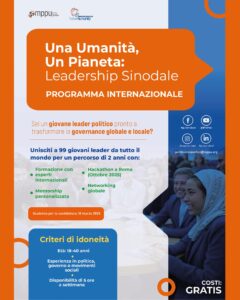
The program will start at the end of April 2025, the deadline for submitting applications is 31st March, it will last for two years and is fully funded (free of charge). It will include contributions from prestigious academic institutions and international NGOs. The format will be mixed, both in person and online through interactive modules with experts from around the world, including renowned political leaders and university professors. A week-long event is planned in Rome, from 6th-12th October 2025, with international guests to co-create proposals for collaborative actions at a global level to solve current social, environmental and economic challenges.
Language will not be an obstacle. Simultaneous translations will be available in Spanish, Portuguese, French, English, Italian and other languages as required.
What does the programme offer?
The initiative is a process of global collective action that integrates training, information, networking, tools and meetings. It offers experiences and methods to increase the quality of policy and improve its impact on social transformation. Participants will have access to learning spaces, collective knowledge-building and exchange with international scholars and experts, with spaces for reflection among the participants alongside dedicated discussion sessions. Each young participant will receive ongoing mentorship from an experiences political leader to refine their political, social, economic and environmental project. In the second year, participants will join a global network of 600 young leaders from different continents.
At the end of the program, participants will receive a formal diploma certifying their participation in the program.
For more information click here or contact politicalinnovation@mppu.org
Stay updated via Instagram, Facebook, LinkedIn mppu_international
Lorenzo Russo
Photo: © Pexels
Encourage the fearful
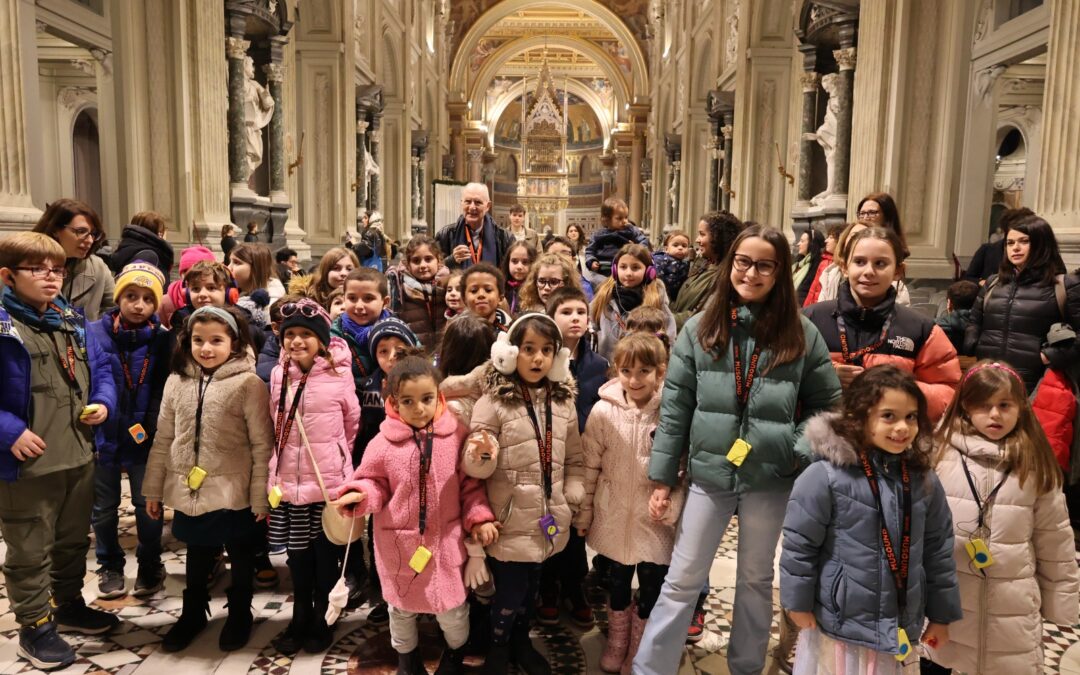
In this year dedicated to the Jubilee of Hope, the Gen 4 (the children of the Focolare Movement) in Rome decided to embark on a journey to discover more about the history of Christianity and understand how to live the Jubilee in their city that is welcoming millions of pilgrims from all over the world. The stages of their journey are the Vatican Basilicas in Rome: St. Peter’s, St. John Lateran, St. Paul’s Outside the Walls and St. Mary Major. They asked Father Fabio Ciardi, OMI, professor of spiritual theology and author of numerous books and publications, to be their guide.
First stop: St. Peter’s Basilica
In October 2024, two months before the Jubilee began, the group of 33 children with as many adults, learned about a very special reality before entering St. Peter’s Basilica. It is located next to the residence where Pope Francis lives. It is the Dispensary of St. Martha, a place where the Gospel becomes incarnate every day through the assistance given to hundreds of mothers and children. It’s an opportunity to explain to the Gen 4 how the Jubilee can be lived concretely by helping others.
Father Fabio explained, “It is a real family clinic, which began this work of care for poor children and their families in 1922. Today over 400 children, with their mothers, are assisted free of charge by about sixty volunteer doctors. They are mostly people without a residence permit, without health care”. Services include gynaecological and paediatric examinations as well as dental care for the homeless.
Father Fabio then linked this story with the story of Saint Peter, using some drawings. The children listened attentively to his voice through headphones: “Jesus met Simon the fisherman and invited him to follow him. ‘Come with me,’ he said, ‘I’ll make you a fisher of men.’ And he gave him a new name, he called him Peter, which means “rock”, because he wanted to build his Church on him”. And as the story continued, we moved to the Basilica to pray at the tomb of St. Peter. “Peter came to Rome. When Nero set fire to the city he blamed the Christians. Peter was killed in the circus of the emperor Caligula that Nero had renovated…and finally the tomb of Saint Peter in his Basilica”. There was an atmosphere of deep recollection among Gen 4, despite the influx of tourists on that Roman Saturday afternoon. Going towards the Holy Door you pass some masterpieces of art. In front of the Pietà, Father Fabio said, “This statue of Our Lady was very dear to Chiara Lubich. Every time she came to the Basilica she stopped here to pray to Mary”.
The stop in San Giovanni in Laterano
The second stage was in January 2025. This time the group was larger: 140 people including 60 children, always under the expert guidance of Father Fabio, met to discover the Basilica of St. John Lateran, full of surprises and treasures related to the history of Christianity. Attentive and curious, with headphones in their ears, for just over two hours Gen4 listened to Father Fabio’s fascinating story.
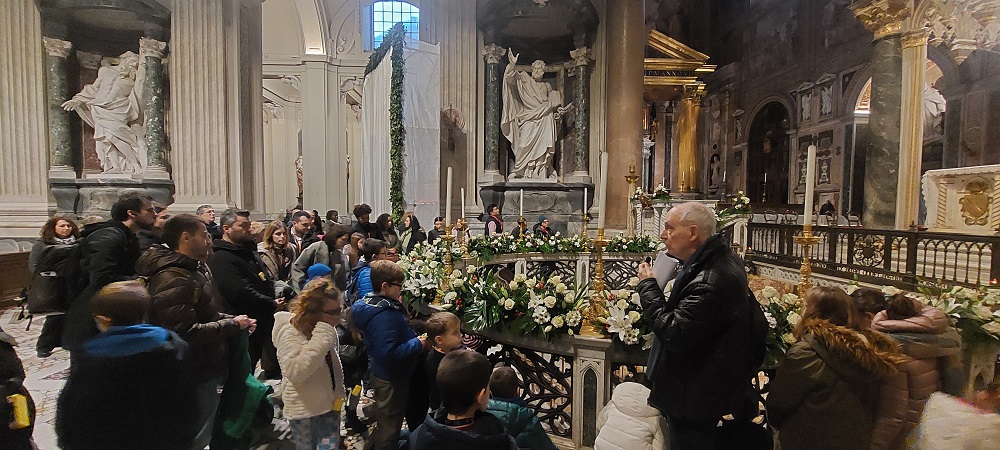
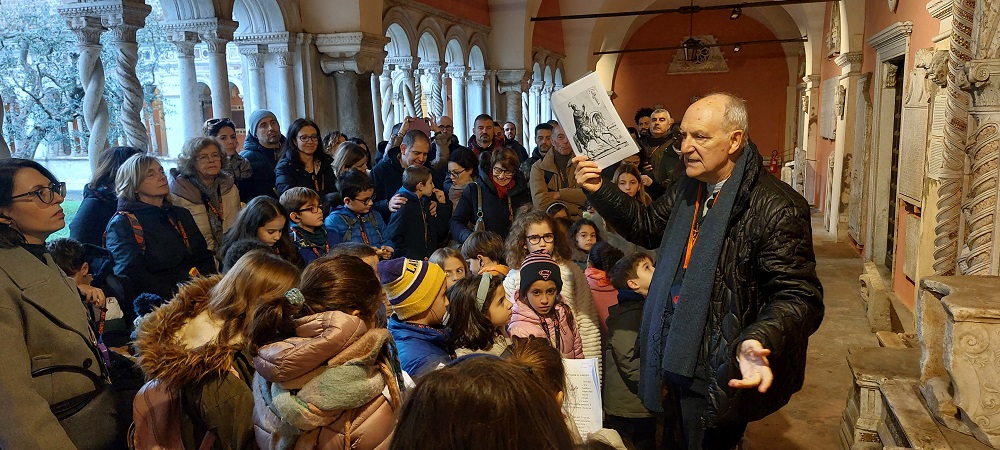
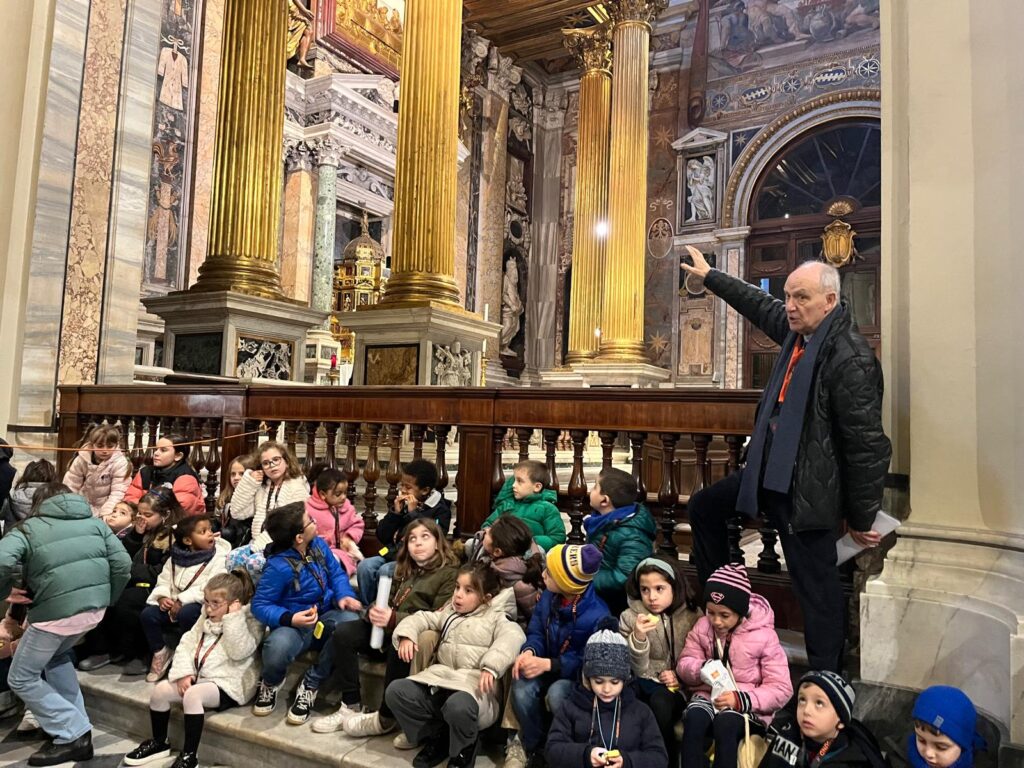
In his blog, Father Fabio wrote, “It was wonderful to tell the story of the obelisk, it was nice to explain the meaning of the cloister, it was nice to tell the stories of St. John the Baptist and St. John the Evangelist and to let the children go and find their statues in the Basilica. It was nice to show the ancient Papal throne and the current one, on which the Pope e sits to take possession of his office. It was nice to point out the relics of the table on which Jesus celebrated the last supper and the one on which Peter celebrated here in Rome. It was good to go through the Holy Door together…It’s good to be with the children and tell them beautiful things…”
At this point, the children have built a special bond with Father Fabio. They walked beside him in the Basilica, held his hand, asked him questions to learn more. A Gen 4 asked, “What’s Heaven like?” He replied, “Imagine a busy school day. When it’s over, you go home to a beautiful, welcoming, warm house, where your parents, grandparents and friends shower you with love. You feel happy in that moment, don’t you? It’s like that in Heaven: it’s a place where you feel good, where you feel at home!” This stage also came to an end. We returned home happy and aware that for us, the Jubilee must be a time to give hope and happiness to the most disadvantaged, to our poor, to those who suffer.
The journey with other generations
Waiting to continue this journey with the Gen 4, the Gen3 (40 teenagers), the Gen2 (30 young people) and a group of adults, fascinated by the positive experience that the children were living with Father Fabio, also wanted to follow the same journey, always guided by him.
Father Fabio wrote in his blog, “First the children, then the teens, then the young people and adults. St. John Lateran, St. Peter, St. Paul and St. Mary Major. So I keep living the Jubilee, over and over. The story of history, art and spirituality, because it is all intertwined, human and divine, past and present. These monuments live on, still speaking after hundreds of years and continue to narrate beautiful things”.
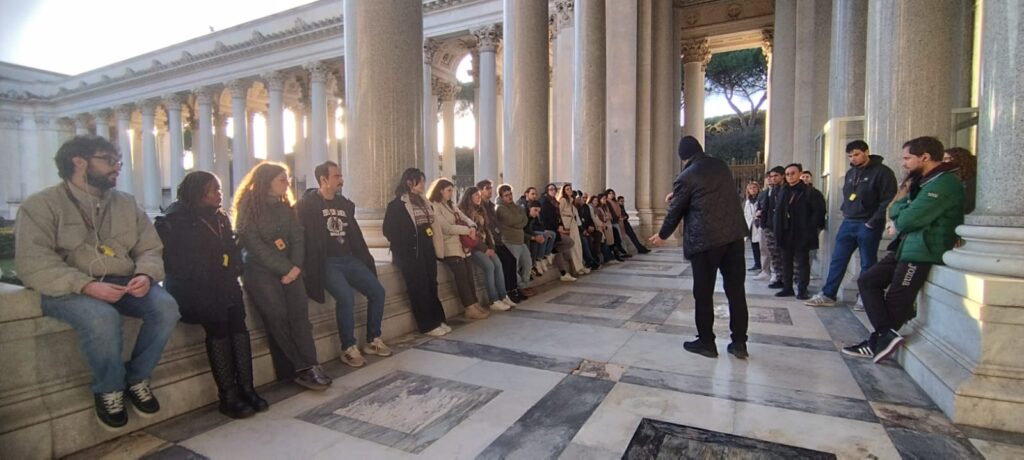
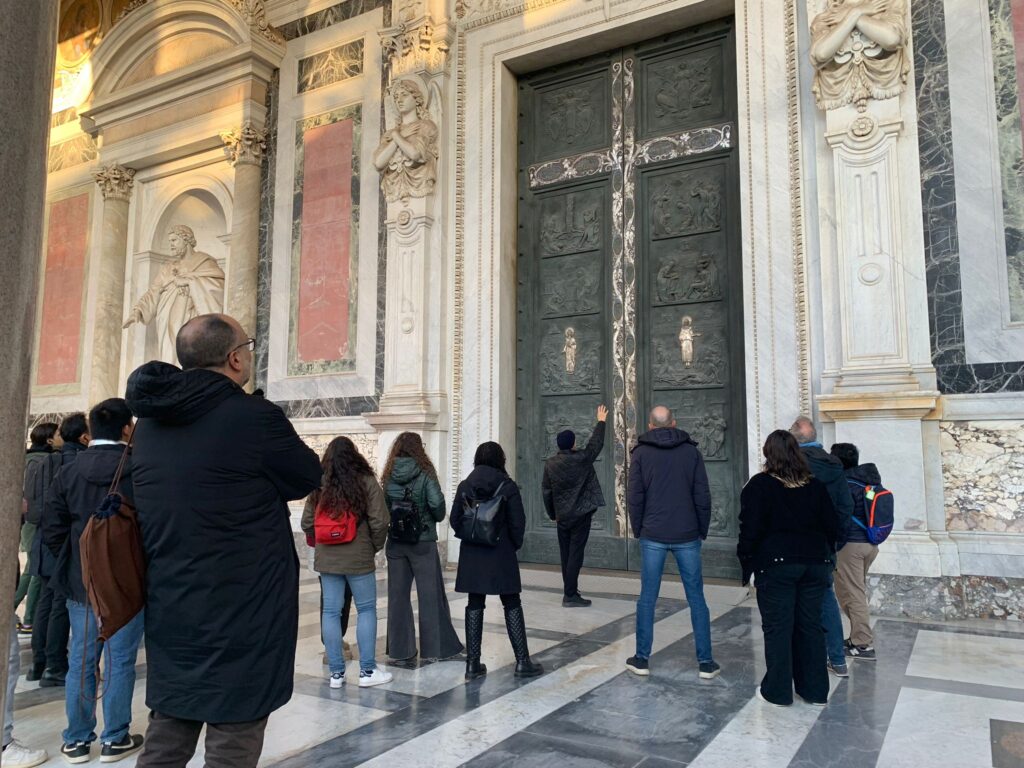
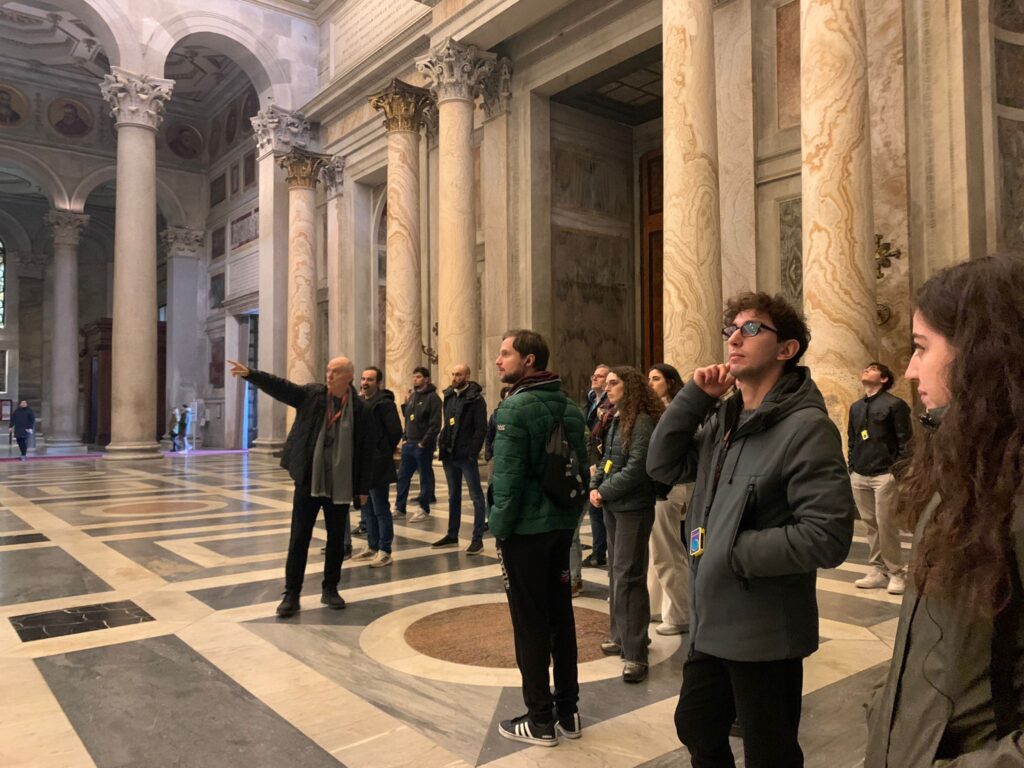
And the young people thanked Father Fabio “for preparing our hearts for such a beautiful experience, you helped us to go through this stage of the holy year together, with meaning and joy. We really liked the atmosphere you managed to create, arousing in us the desire to visit together other places in Rome which were important for the first Christians and you gave us the desire to deepen the meaning of being pilgrims on the way to the goal of Paradise”.
Lorenzo Russo
Help each other to keep on loving
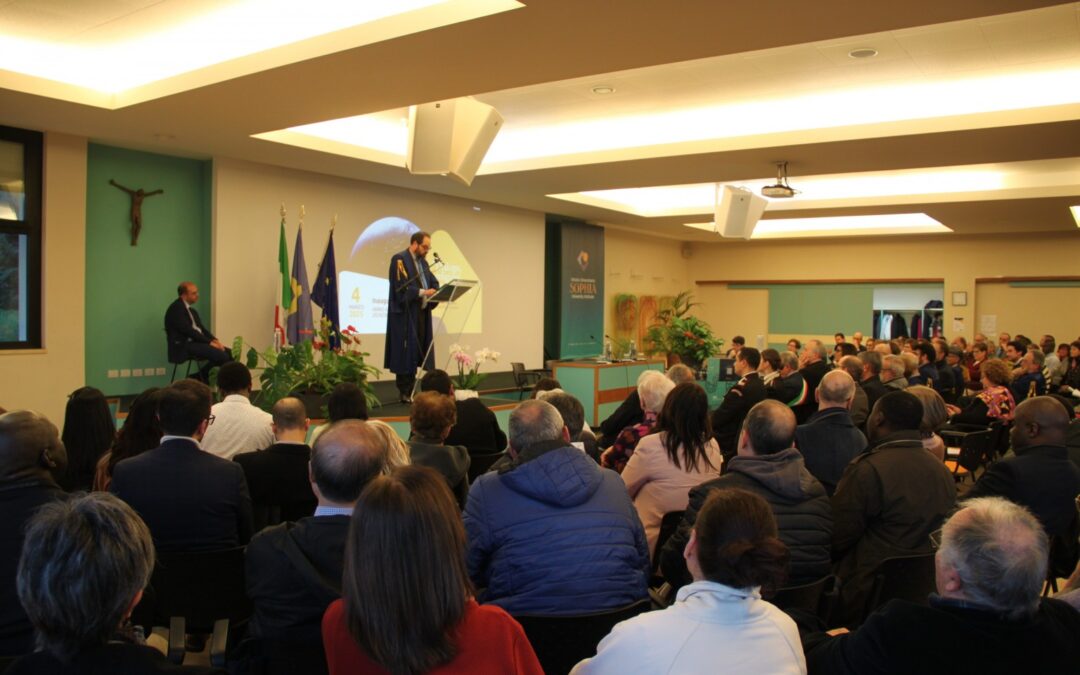
On Tuesday 4th March, the 17th academic year of the’Sophia University Institute in Loppiano (Figline and Incisa Valdarno – Florence) was inaugurated. The ceremony took place in the main hall of the Institute, in the presence of the entire academic community and a representation of the rich network of relationships and collaborations that the Sophia University Institute has been able to weave with institutions, other universities and third sector organisations in these first 17 years of its existence.
The following people took part: the Rector, Declan O’Byrne; the Chancellor of the Institute, Gherardo Gambelli, Archbishop of Florence; the Vice-Chancellor, Dr Margaret Karram, President of the Focolare Movement; the Bishop of Fiesole, Stefano Manetti; the mayor of Figline and Incisa Valdarno, Valerio Pianigiani; Paolo Cancelli, director of the Development Office of the Pontifical University Antonianum; Marco Salvatori, President of the Giorgio La Pira International Student Centre
The centrepiece of the ceremony was the inaugural lecture entitled ‘Dialogue, religions, geopolitics’ given by Fabio Petito, Professor of International Relations and Director of the Freedom of Religion or Belief & Foreign Policy Initiative at the University of Sussex, as well as Scientific Coordinator of the Religions and International Relations Programme of the Ministry of Foreign Affairs and ISPI (Institute for International Political Studies). Petito emphasised that today, ‘religion seems to be part of, and sometimes at the centre of, the current scenario of instability and international crisis’. However, although this is a less visible phenomenon globally, ‘it cannot be denied that in the last quarter of a century there has been a significant increase in the efforts of representatives of religious communities to respond to violence and political tensions through initiatives of dialogue and interreligious collaboration’. Petito thus emphasised the importance that places like the Sophia University Institute can have in creatively deepening and spreading the culture of encounter and ‘making small seeds of hope and fruits of unity and human fraternity blossom’.
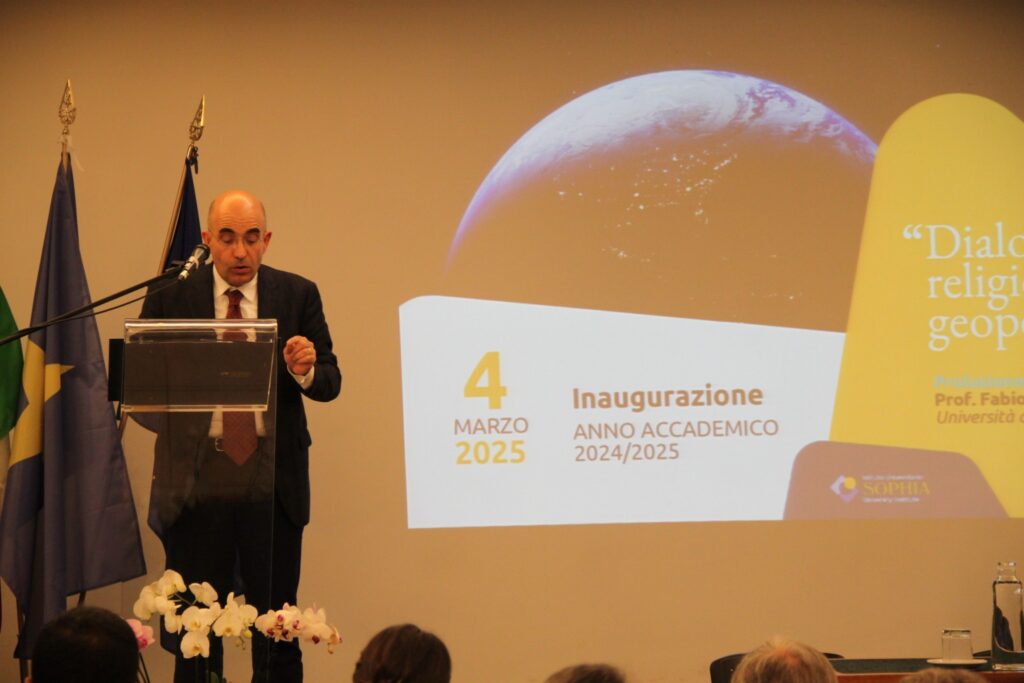
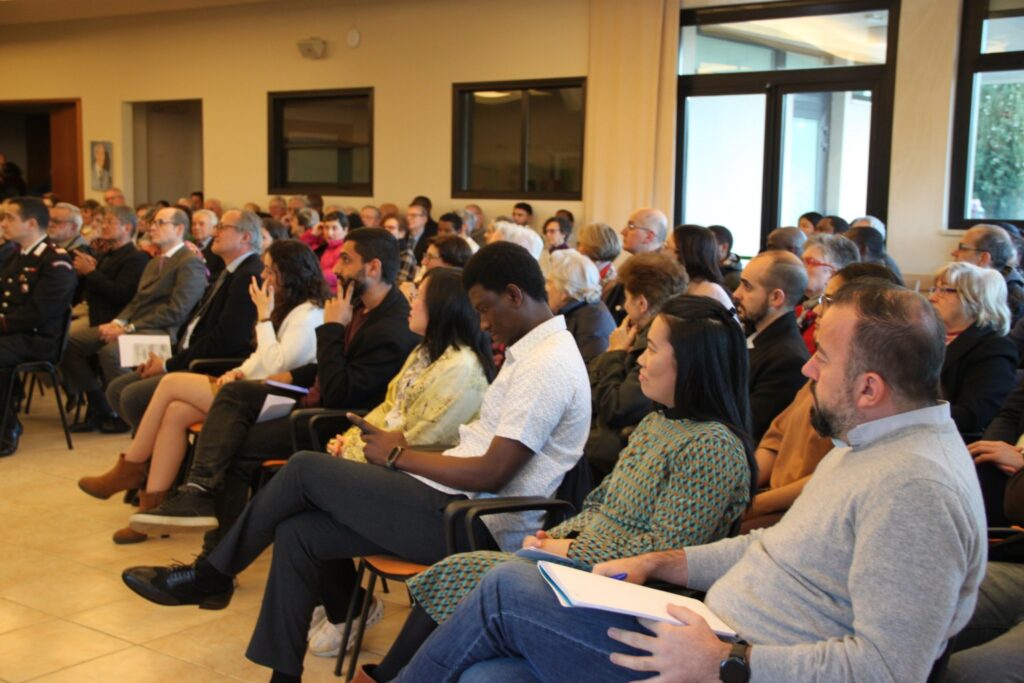
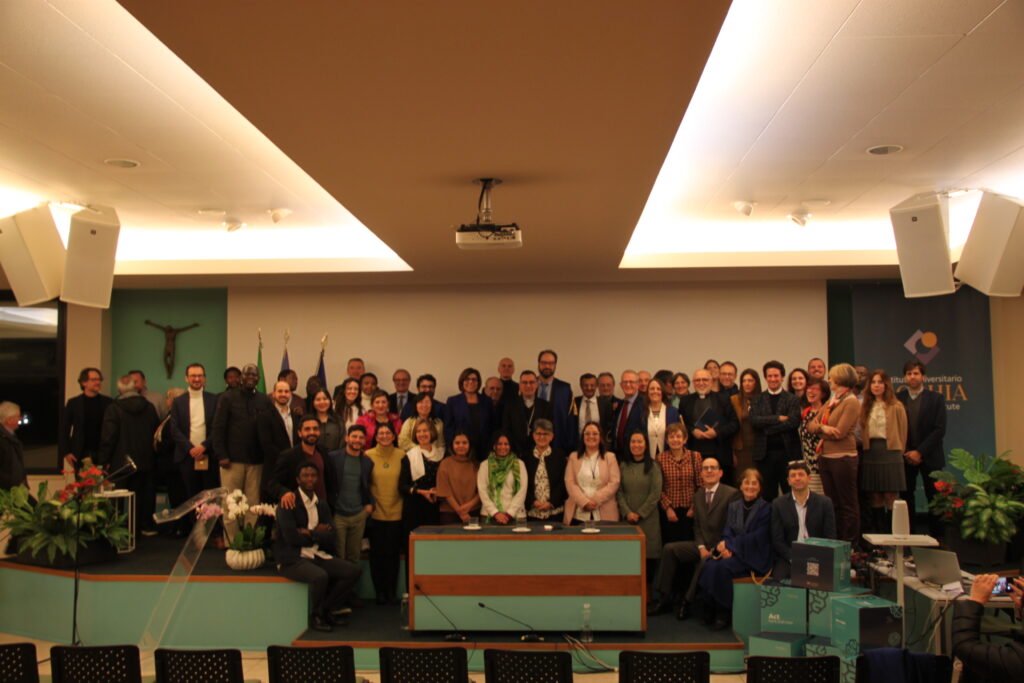
In true Sophia style, an international academic community and a laboratory of life, education, study and research, the inaugural lecture was followed by a dialogue, moderated by the journalist and Vatican expert Andrea Gagliarducci (Eternal Word Television Network and ACI Stampa), which involved the Chancellor Arcbishop Gherardo Gambelli, on his first visit to the Institute, the Vice-Chancellor Dr Margaret Karram and six students from the university.
The dialogue, starting from the personal stories of young people from the Holy Land, the Philippines, Argentina, Kosovo, Sierra Leone and Peru, touched on topics of global importance and burning current affairs: the value of grassroots diplomacy for conflict resolution and the search for peace; the commitment to a more just and equitable economy, with the experience of Economy of Francesco; the role of young people from the Mediterranean in building a culture of encounter; the value
of reconciliation and interreligious dialogue, in particular between Christians and Muslims with the Sophian experience of Wings of Unity; the hopes of young Africans involved in the Together for a New Africa project, for change and the common good of their continent; the concerns and fragility of young people in search of a vocation and fulfilment in a globalised world.
The inauguration of the 2024-25 academic year highlighted, once again, the ability of this still small academic organisation to train young people to face the complexity of today’s world, in a trans-disciplinary perspective, and to work in synergy with specialists from various fields and institutions to promote dialogue between cultures in the concreteness of social life, giving impetus to the inner, intellectual and social growth of people in a dynamic of reciprocity.
Statements
The Grand Chancellor of the Institute, H.E. Mons. Gherardo Gambelli, Archbishop of Florence: “Among the objectives of the Institute is ‘to promote, in the concreteness of social life, dialogue between cultures, fostering the inner, intellectual, and social growth of individuals in a dynamic of reciprocity.’ Several key words emerge from this project: promotion, social life, dialogue, inner, intellectual, and social growth, reciprocity. All these terms point towards personal development, enabling individuals not only to inhabit the ‘we’ of the community they belong to with dignity but also to feel ever more inhabited by that ‘we’ to which they belong. A ‘we’ that does not seek to oppose a hypothetical ‘you’ but is instead capable, every day, of embracing all that appears with the face of the other, the different, the marginalized.”
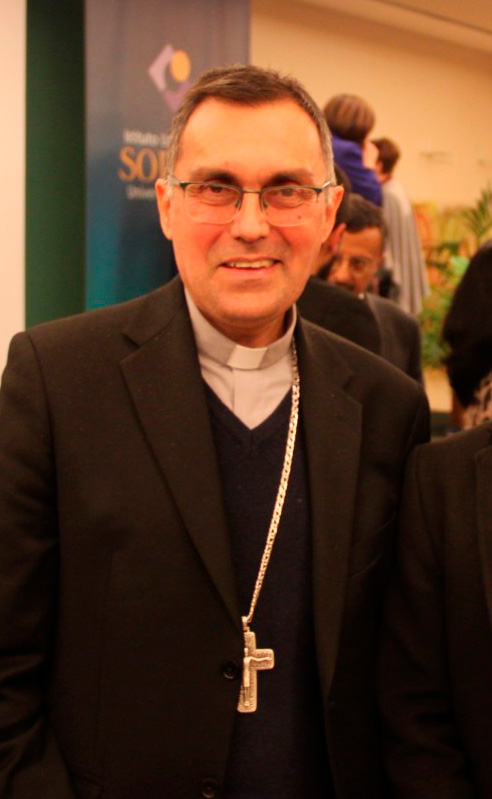
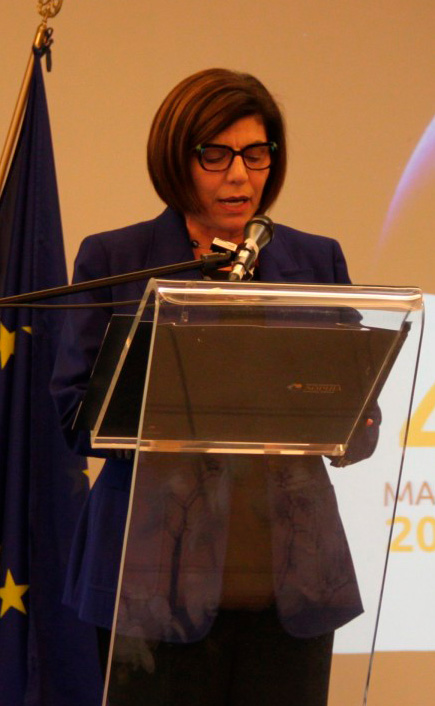
The Vice Grand Chancellor, Dr. Margaret Karram, President of the Focolare Movement: “It is important that in an institution like ours, we emphasize dialogue and the role of religions in today’s global context, where—as we have seen in these past days—individuals and nations risk drowning in a state of confusion and despair. […] The Sophia University Institute, as a ‘home’ for a culture founded on the Gospel, is committed with and in the Church, to offer responses and guidance in the light of the Charism of unity. It is now up to us to move forward with courage and commitment, ensuring that this University Institute is increasingly recognized for its contribution to promoting a culture of unity that contributes to building peace and fraternity among individuals and peoples.”
Declan O’Byrne, Rector of the Sophia University Institute: “Together, as an academic community united by a common ideal, we continue to build Sophia as a beacon of wisdom and unity in the landscape of higher education. May our collective commitment continue to enlighten minds, inspire hearts, and transform society—one step at a time—towards that civilization of love to which we all aspire.”
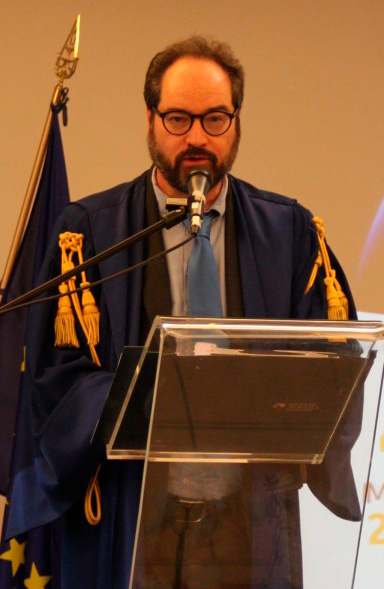
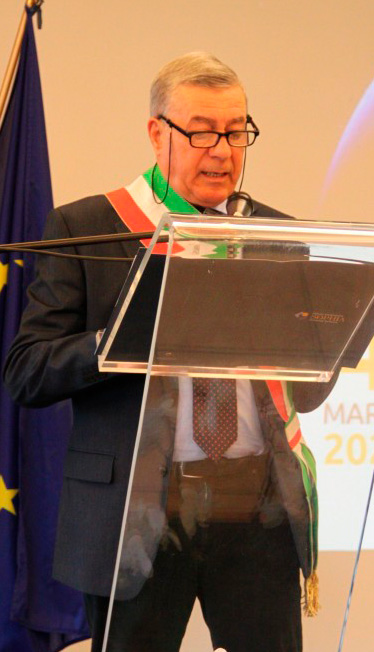
Valerio Pianigiani, Mayor of Figline and Incisa Valdarno: “In the face of divisions and violence that cannot leave us indifferent, knowledge, understanding, tolerance and awareness of the world around us can serve as the antidote to brutality and divisions. A bridge that fosters understanding of the other, with the aim of working together and committing ourselves to the common good. I extend my gratitude to those who work in this Institute with passion and dedication every day, nurturing ever more aware minds here as well, in Figline and Incisa Valdarno—a community that stands firmly by the values of peace, solidarity, and dialogue.”
Stefano Manetti, Bishop of Fiesole: “The commitment to dialogue and communicate with everyone reduces distances, eliminates marginalization and becomes a sign of evangelical hope—something of which we are in great need. I therefore encourage professors and students to continue working for the benefit of the least among us through the gift of relationships, the sharing of cultural themes, and to keep being ‘angels of hope’ for all those you encounter on your path.”
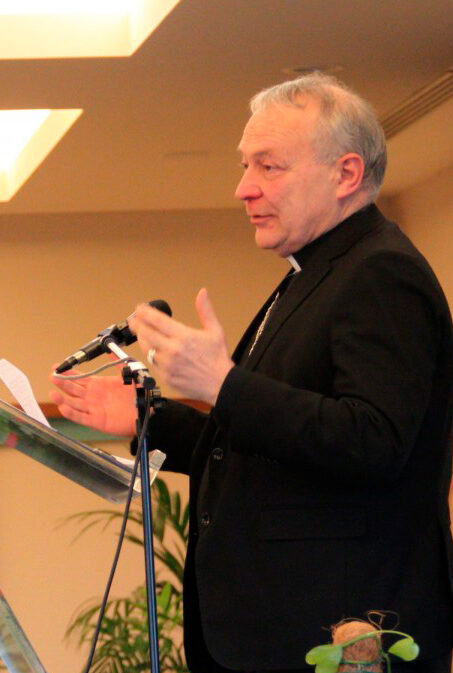
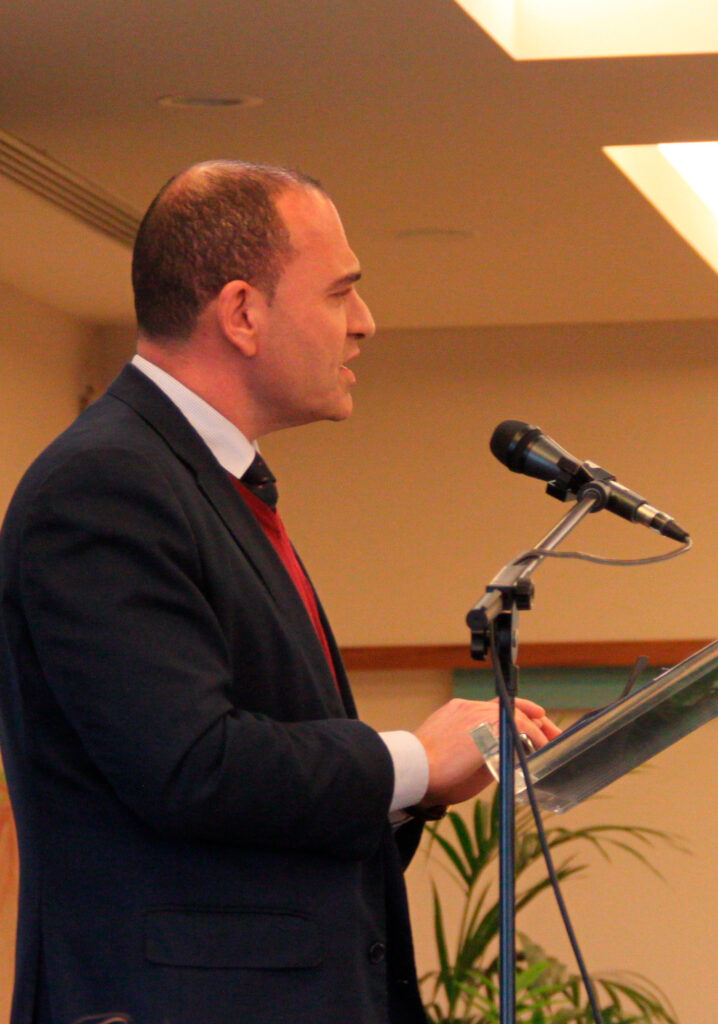
Paolo Cancelli, Director of the Development Office of the Pontifical Antonianum University: “We are convinced that we must work together in the culture of dialogue as a path, in common collaboration as a way of acting, and in mutual understanding as both method and principle. […] We must place humility at the centre, the vocation to serve a process in which we hold one certainty: no one is saved alone. And it is precisely within this logic, the symphony of diversity, that the time has come to bring forth our talents, emotions and willpower to create the opportunity for a different future. A future in which fraternity and harmony can, in some way, guide us within that symphony of diversity, making the university’s mission truly authentic. I believe that at both an academic and scientific level, this is realized through inter- and trans-disciplinarity. We are facing a complex and multifaceted reality and we cannot solve challenges alone, from a single field of study. We need the idea of being together.”
Marco Salvadori, President of the Giorgio La Pira International Student Centre: “It is with great joy that I bring greetings from the Giorgio La Pira International Student Centre. The inauguration of a new academic year is always a moment of great enthusiasm and reflection. It is an opportunity to look ahead, embrace challenges and contribute to building a fairer and more sustainable world through study, commitment and dedication. What we celebrate today is not just the beginning of a new academic year, but also the chance to learn, grow together and build lasting bonds between cultures and generations. I wish all of you, especially the young students, a year full of discoveries and of personal and professional development.”
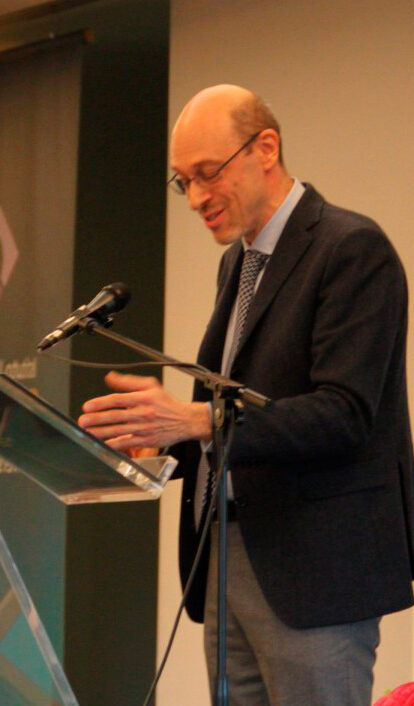
Tamara Pastorelli
Photo: © Lucia Ciciriello – www.loppiano.it
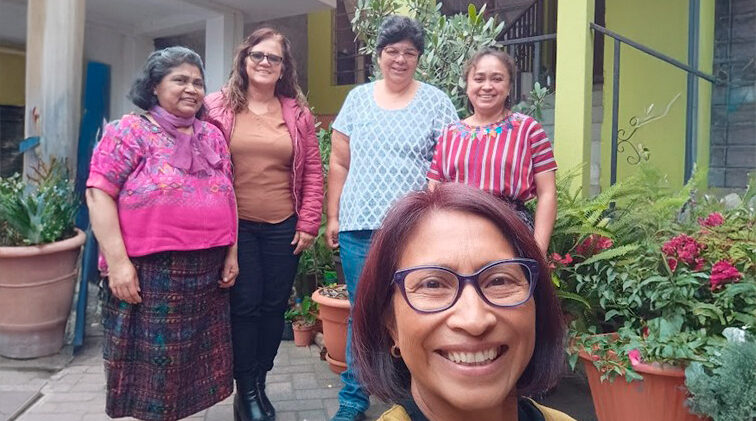
Marta, Lina, Efi and Moria are four women, four focolarine, who have followed different paths in life and who have now found common ground between dreams and reality. They chose to move to Chimaltenango from their previous communities, embarking on an experience of living in a multicultural city where poverty and ethnic fractures are part of everyday life.
Chimaltenango is a city in Guatemala, 50 km from the capital, at an altitude of 1800 meters above sea level. Nearly 120,000 inhabitants of 23 different indigenous peoples have settled there in order to survive economically.
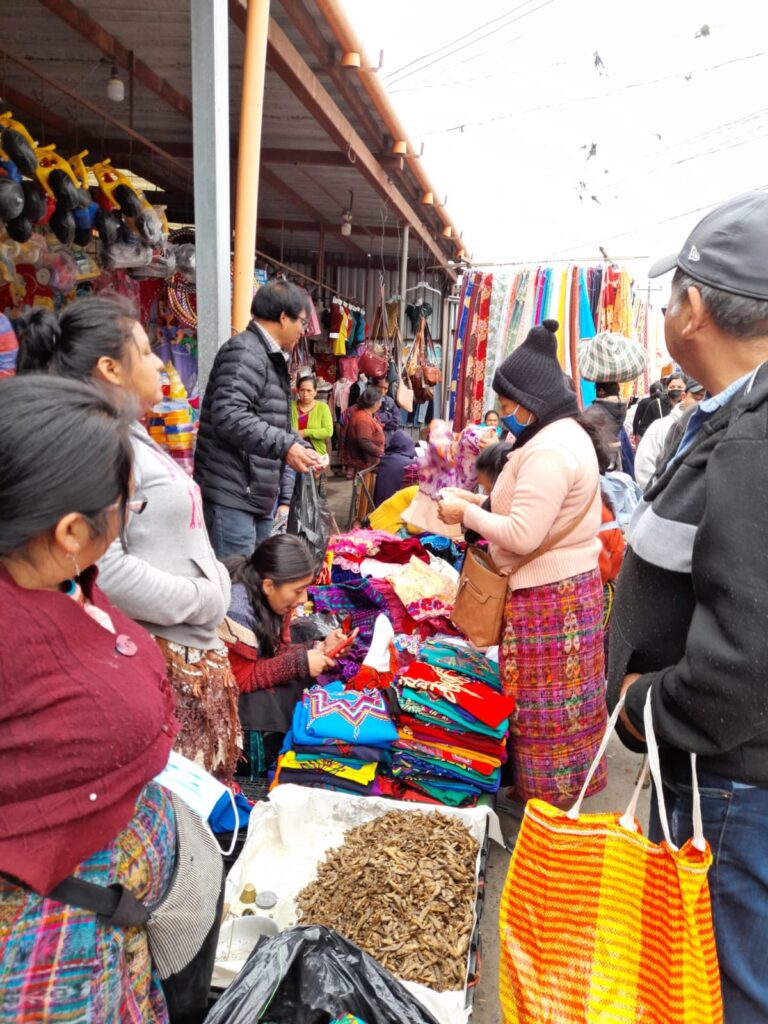
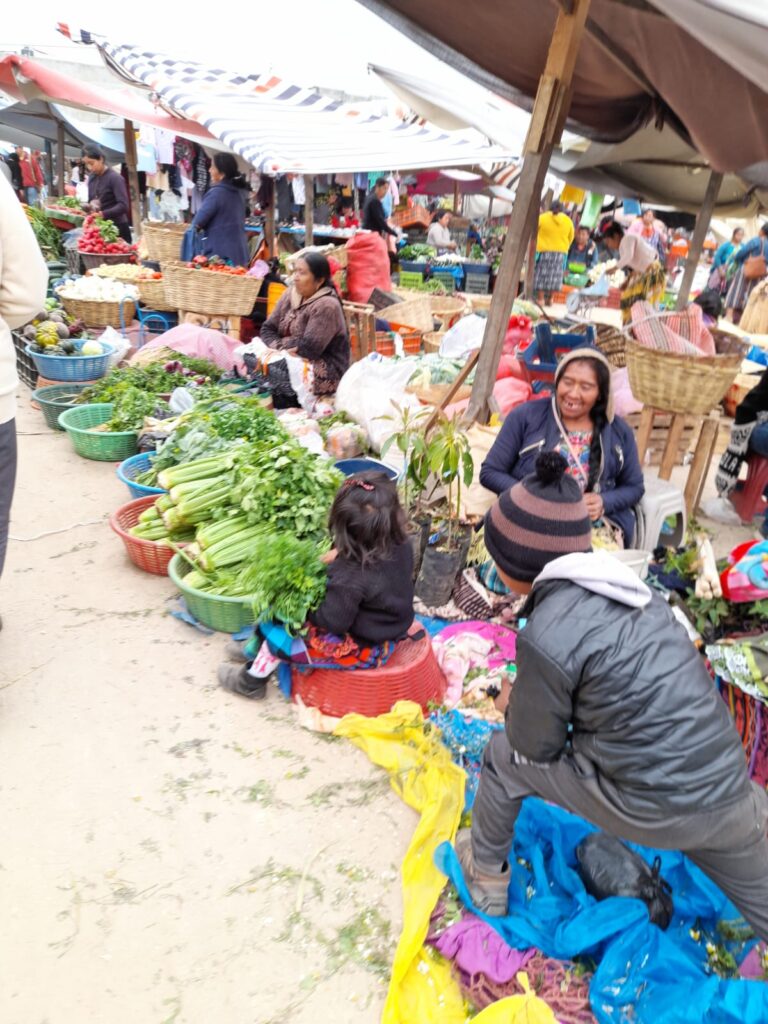
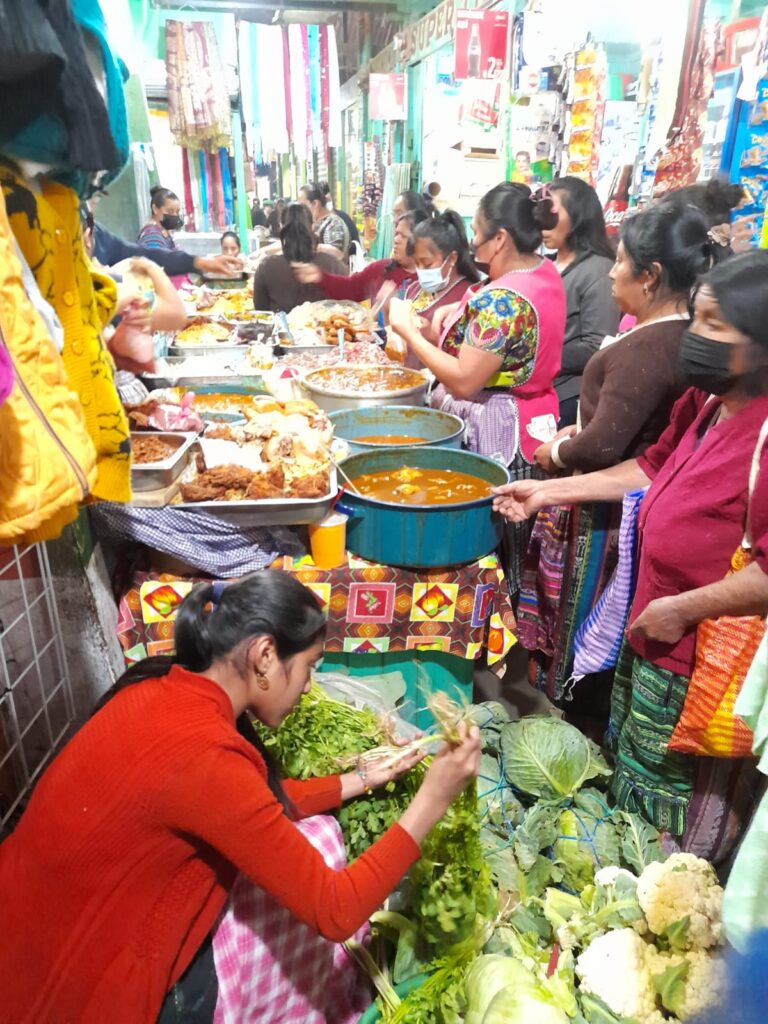
Efi, from Panama told us, “I lived in Argentina for many years. Then I spent a few years in Mexico and, just before the pandemic, I arrived in Guatemala where I remained only 3 months as I had to return to Panama to be close to my mother who became ill and then passed away. That was a year that also helped me to rethink many things, to take stock of what I had lived up to that point and to renew my choice of donation to God made years ago”. She returned to Guatemala for this project in Chimaltenango.
She continued, “I grew up in a rural environment among very simple people and my dream has always been to do something for the humblest in society. There is immense poverty here. And there are also indigenous communities, people who have encountered the spirituality of the Movement and who, due to the pandemic and their social circumstances, have been left on the margins (of society)”.
Lina is Guatemalan, Kaqchikel, of Mayan origin. She explained that one of the most obvious fractures is between indigenous people and mestizos (also called “ladinos” in Guatemala, referring to all those who are not indigenous). Relationships are not fraternal, there is no dialogue. She said, “It has always been a goal for me to endeavour to overcome that fracture. From the moment I had my first contact with the Focolare, I thought that this was the solution for my culture, for my people, for my community. ” She recalled the moment in December 2007 when, at the end of her course of formation to become a focolarina, she greeted Chiara Lubich and said to her: “I am indigenous and I am committed to bringing this light to my Kaqchikel people”. She remembered that she “felt that it was a commitment expressed to Chiara but made to Jesus”. Upon her return to Guatemala, she dedicated herself to working with young people, always with the aim of generating bonds of unity both in indigenous communities and in the city.
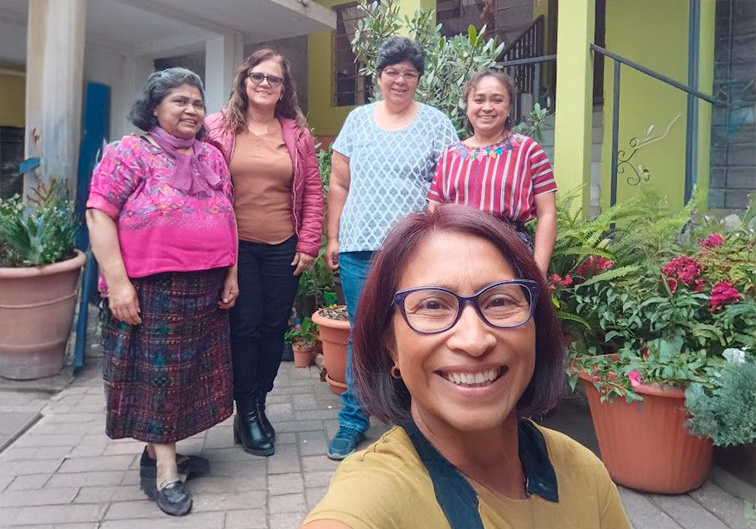
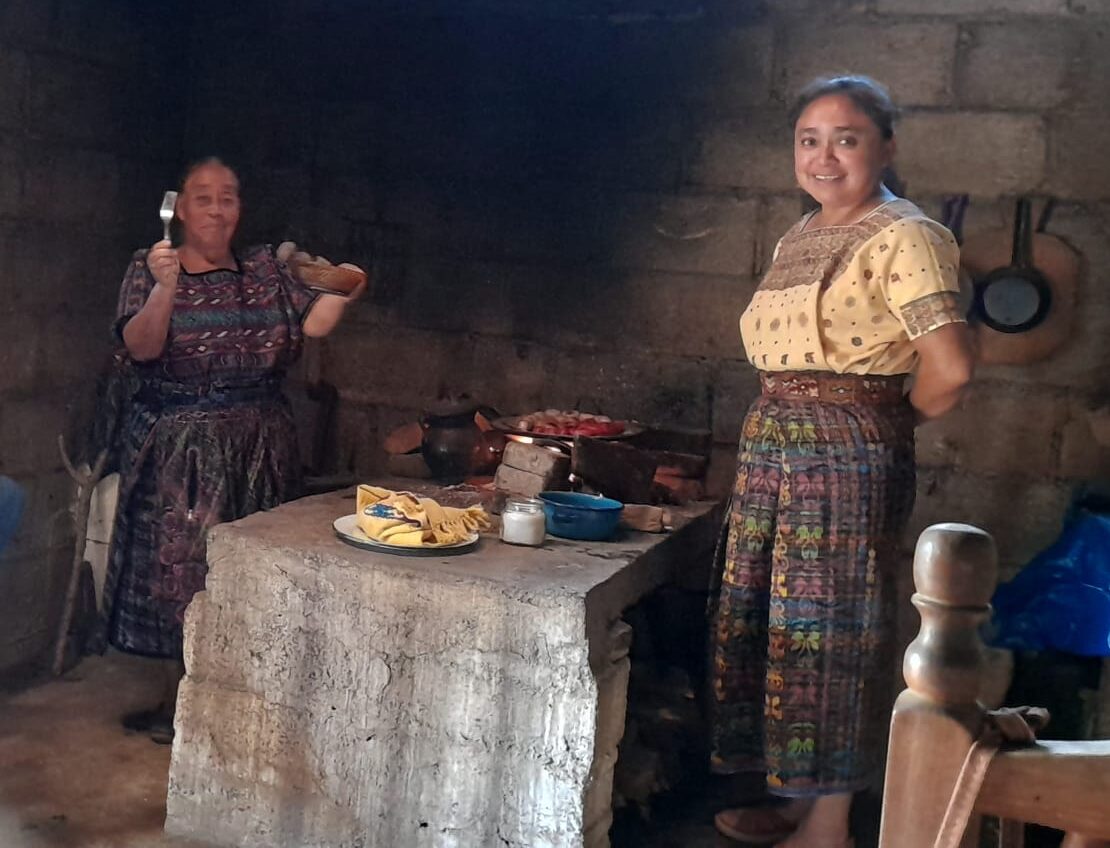
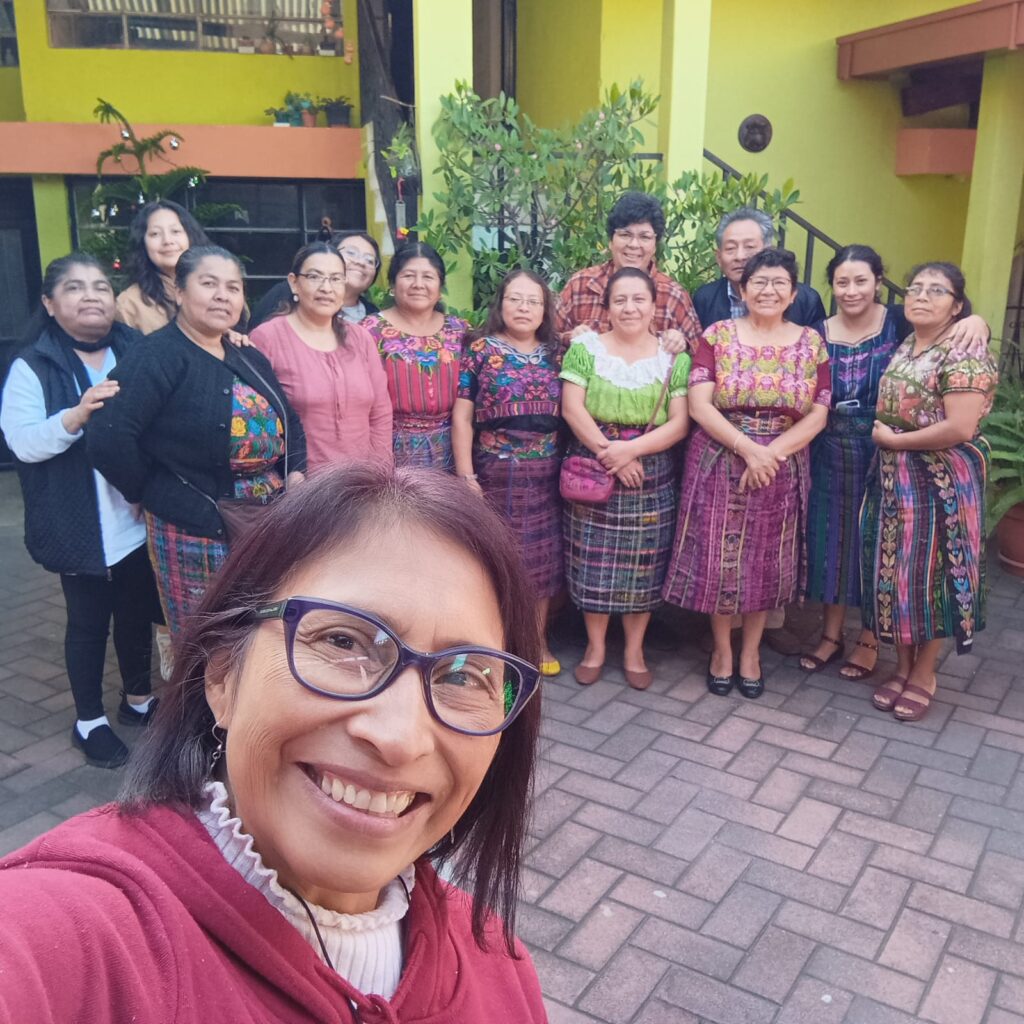
Marta is also from Guatemala, of mixed race. In her early years in the focolare, she was able to devote herself to spreading the charism of unity in indigenous communities. Later, she managed the Mariapolis Centre, the Focolare’s residential centre in Guatemala City. It was a demanding task that lasted 23 years and saw the process of national reconciliation and the reclaiming of indigenous peoples’ rights, because various indigenous communities chose the Mariapolis Centre as a meeting place. Then she was in Mexico for a while. At that time discussions about identity arose and the question arose spontaneously in her: “What is my identity? What are my roots?” She found the answer in the “Virgin of Guadalupe” who, when she appeared in Mexico in 1531, was depicted on Juan Diego’s poncho with physical characteristics typical of native peoples. “For me it was to understand that I was a mestiza like her, that she has both roots and can dialogue with both groups”.
Moria, who is from Chimaltenango, lives with her natural family and is part of the focolare as is Lidia, a married focolarina who lives in Guatemala City.
Stories that intertwine until they settled in this city that unites so many backgrounds and cultures into one. Efi said, “Our desire is to be with people, to get closer. In simple, everyday things: that greeting, that smile, that pausing, simply being with that lady who doesn’t speak Spanish because she speaks her own language and we don’t understand each other”. And she recounted: “One day I needed to buy bread. I went to the market and the women who were selling were sitting on a wicker mat. If I wanted to begin a conversation with one of them, I would bend down to be on the same level and since it was a place for trading, I would try to be fair with her”.
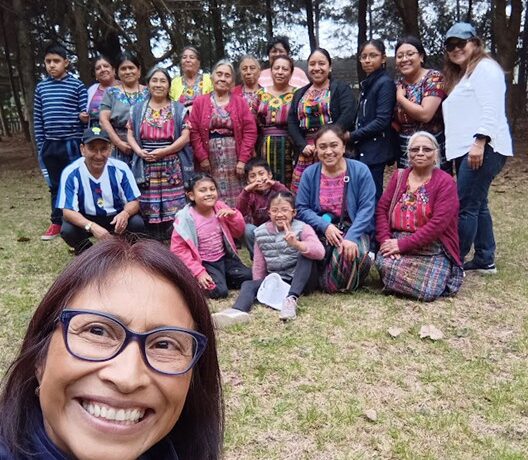

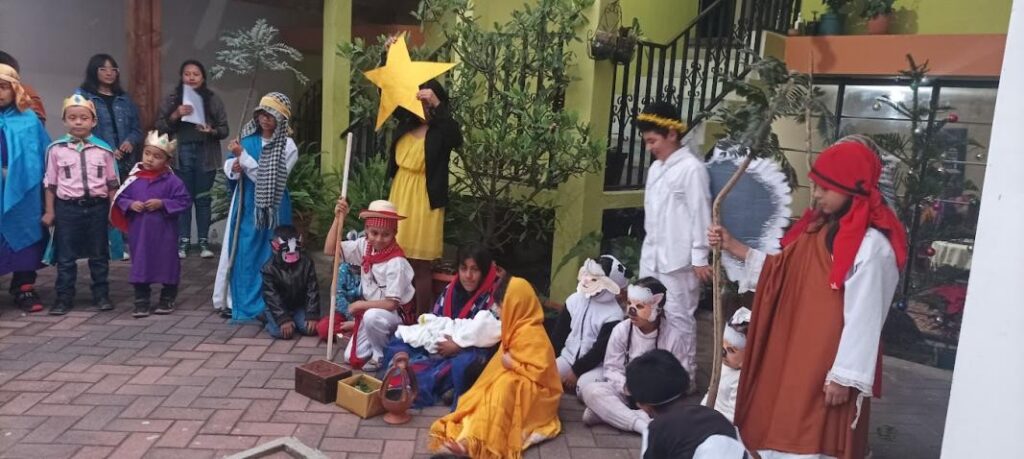
Lina added, “Since we arrived, we have tried to reconnect with people who met the spirituality of unity over past years, by going to visit them in their homes, bringing something, for example some fruit, as is the custom”. In this way, a circle of reciprocity has grown and people began to keep in touch with the focolare which is now often filled with the voices of mothers with their children, young people and, sometimes, some fathers who pluck up the courage to come too. And so, almost effortlessly, a community has formed around this new focolare in the heart of Guatemala’s indigenous culture.
Carlos Mana
Photo: © Focolar Chimaltenango
Give priority to prayer
Rediscover the secret of life
Make yourself small
Know how to forgive
Look on the positive side
Do not criticise

Jesus had come down from the mountain where he had spent the night in prayer and then had chosen his apostles. When he reached a flat place, he began to preach to them, beginning with the proclamation of the Beatitudes.
Luke’s and Matthew’s gospels differ: in Luke’s text there are only four Beatitudes and they concern the poor, the hungry, the suffering and the afflicted, with the addition of as many admonitions against the rich, the satiated and the arrogant [1].
Jesus revealed God’s special love for the poor when he was in the synagogue at Nazareth [2] and, filled with the Spirit of the Lord, he proclaimed that his mission was to bring glad tidings to the poor, deliverance to the captives and freedom to the oppressed.
Jesus went on to exhort the disciples to love even their enemies;[3] a message that finds its ultimate inspiration in the behaviour of the heavenly Father: ‘Be merciful, as your Father is merciful’ (Lk 6:36).
This statement is also the starting point for what follows: ‘Do not judge and you will not be judged; do not condemn and you will not be condemned; forgive and you will be forgiven’ (Lk 6:37). Jesus then goes on to reprimand the listeners by using a deliberately disproportionate image:
Why do you look at the speck of sawdust in your brother’s eye and pay no attention to the plank in your own eye?’
Jesus truly knows our heart. How often in everyday life do we have the sad experience of finding it easy to harshly criticise other people for their errors and weaknesses without taking into account that in doing so, we attribute to ourselves a prerogative that belongs to God alone? The fact is that in order to ‘remove the plank’ from our own eye, we need that humility that comes from the realisation that we are sinners continually in need of God’s forgiveness. Only people who have the courage to notice their own ‘plank’ and what they personally need in order to change for the better, will be able to understand without judging or exaggerating, the frailties and weaknesses in themselves and in other people.
Nonetheless, Jesus does not invite us to close our eyes to what is happening around us and just let things run their course. He wants his followers to help each other as they progress along the path to a new life. The apostle Paul also frequently reminds us to show concern for and correct those who are idle and disruptive, to encourage the disheartened, to help the weak and to be patient with everyone [4]. Only love is capable of serving others this way.
Why do you look at the speck of sawdust in your brother’s eye and pay no attention to the plank in your own eye?’
How can we put this word of life into practice?
In addition to what has already been said, during this Lenten season we can ask Jesus to teach us to see others as he sees them, as God sees them. And God sees with the eyes of the heart because he always gazes upon us with love.
To help each other even more, we could restore a practice that was decisive for the first group of Focolare girls in Trent.
Chiara Lubich once told a group of Muslim friends, ’At the beginning, it was not always easy to love in a radical way. Even among us, dust could settle on our relationships and unity could weaken.
This happened, for example, when we became aware of the faults, the imperfections of others and we judged them and so our mutual love diminished. One day, we decided that we should try to counter this situation. We made an agreement among ourselves and called it a ‘pact of mercy’. We decided that every morning we would see the people we met – at home, at school, at work, etc. as new – new – not calling to mind their faults at all but covering everything with love. It was a strong and challenging commitment, made by all of us together, that helped us to always be the first to love, in imitation of the merciful God, who forgives and forgets.” [5]
Edited by Augusto Parody Reyes and the Word of Life Team
[1]Cf. Lk 6, 20-26
[2]Cf. Lk 4, 16-21
[3]Cf. Lc 6, 27-35
[4] Cf. 1 Ts 5, 14
[5] C. Lubich, “Love for Neighbour.” Conversation with Muslim Friends . Castel Gandolfo, 1 Nov 2002
©Photo- Yan Krukov-Pexels

It seems obvious that we are made to relate to other people: in fact, we could even say that our lives are intertwined by the relationships we make. However, we sometimes we risk spoiling the latter with our harsh or superficial judgements.
Throughout history, various images have become part of everyday language. Thus, in
ancient tradition we find a well-known expression that says: ‘Why do you look at the speck in your brother’s eye and not notice the plank in your own?’[1] Equally proverbial is the image of the two saddlebags: one in front of our eyes, filled with the faults of other people which we easily see, and the other on our backs, holding our own faults which we then struggle to recognise.[2] There is also a Chinese proverb that says, ‘Man is blind to his own faults but has eagle eyes for those of others.’
This does not mean that we should indiscriminately accept what other people do and just let events run their course. Faced with injustice, violence or oppression, we cannot close our eyes. We must commit ourselves to change and start by looking at ourselves and listening sincerely to our own consciences to discover what we need to improve. Only then can we ask ourselves how we can concretely help others by sometimes offering advice and correction.
Each one of us needs ‘another point of view’ that offers a perspective different from our
own, enriching our ‘truth’ and helping us to avoid self-referentiality and those errors of judgement that are part of our human nature.
The word “mercy” may seem old fashioned but it is rich with meaning relevant to today: we can be merciful first towards ourselves and then towards others too. In fact, only if we are able to accept and forgive our own limitations will we be able to welcome the weaknesses and mistakes of others. Indeed, when we realise that unconsciously we may be feeling superior and in a position to judge other people, it is vital that we are willing to take ‘the first step’ towards the other person to avoid damaging the relationship.
Chiara Lubich told a group of Muslims about her experience when she and her companions lived in a small house in Trent as they began their adventures at the start of the Movement. Not everything was simple and there were misunderstandings. “It was not always easy to love in aradical way […] “Dust” could settle on our relationships and unity could diminish. This happened, for example, when we became aware of the faults and imperfections of others and judged them, so our mutual love grew cold. One day, we decided we should try to counter this situation and we decided
to make a pact among ourselves and called it a ‘pact of mercy’. We decided that every morning we would see the people we met – at home, at school, at work, etc. – as new without calling to mind their faults but covering everything with love.” [3] his is a ‘method’ worth putting into practice in groups at work, in the family and in
communities of all kinds.
© Foto di Cottonbro studio – Pexels
THE IDEA OF THE MONTH is currently produced by the Focolare Movement’s “Centre for Dialogue with People of Non-religious Beliefs”. It is an initiative that began in 2014 in Uruguay to share with non-believing friends the values of the Word of Life, i.e. the phrase from Scripture that members of the Movement strive to put into practice in their daily lives. Currently, THE IDEA OF THE MONTH is translated into 12 languages and distributed in more than 25 countries, with adaptations of the text according to different cultural sensitivities. dialogue4unity.focolare.org
[1] (Lc 6,41)
[2] Esopo (μῦθοι) , Fedro (Fabulae)
[3] C. Lubich, L’amore al prossimo, Conversazione con gli amici musulmani, Castel Gandolfo, 1° novembre 2002. Cf. C. Lubich, L’Amore reciproco, Città Nuova, Roma 2013, pp. 89-90.
Listen!
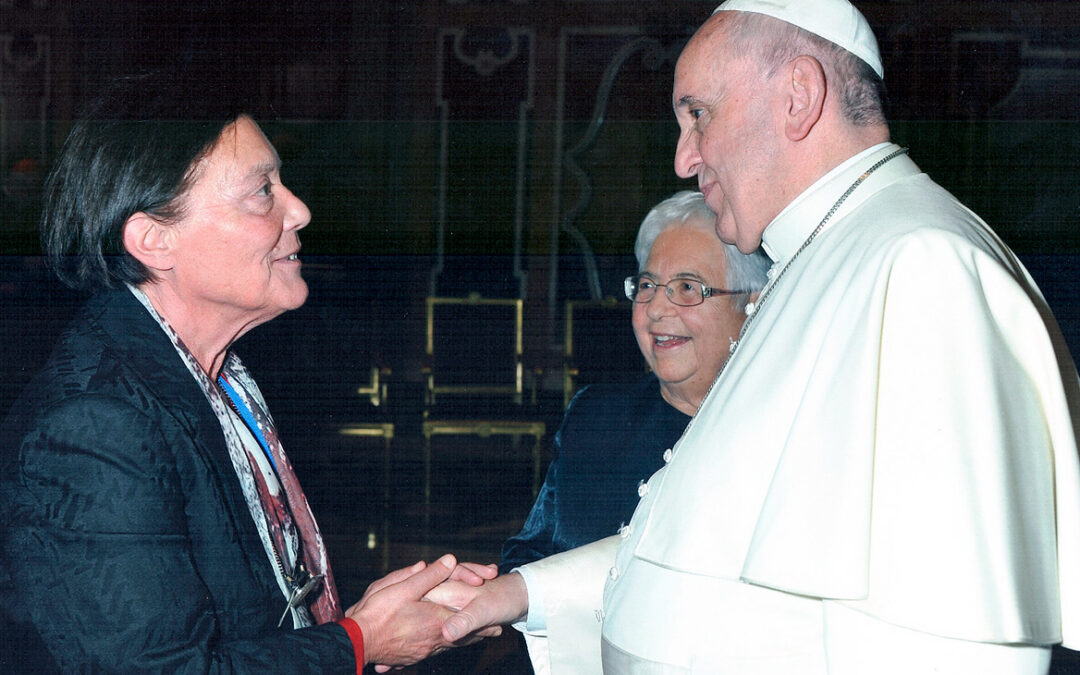
Dear Pope Francis, you may not remember, but we met on 26th September, 2014, when you received a delegation from the Focolare Movement in a private audience. I was part of it, Luciana Scalacci from Abbadia San Salvatore, representing the non-religious cultures that also have a home in the Focolare. I am one of those people who, as Jesus Moran once told me, “helped Chiara Lubich to open new horizons for the charism of unity”. I am a non-believer who has received a great deal from the Movement.
On that extraordinary day, I had the privilege of exchanging a few words with you that I will never forget and that I recall here:
Luciana: “Your Holiness, when you took office as Bishop of Rome, I wrote you a letter, even though I knew that you probably wouldn’t read it with all the letters you receive, but it was important for me to send you my affection and my best wishes, because Your Holiness, I do not recognize myself in any religious faith, but for more than 20 years I have been part of the Focolare Movement, it gave me back the hope that it is still possible to build a united world.”
Pope: “Pray for me, but you are not a believer, you do not pray, so keep me in your thoughts, a lot, think of me, I need it”.
Luciana: “But Holiness, in my own way I do pray for you.”
Pope: “A secular prayer and you keep me very much in your thoughts, I need it”.
Luciana: “Holiness, stay healthy, with courage, with strength! The Catholic Church and the whole world need you. The Catholic Church needs you. ”
Pope: “Keep me in your thoughts and pray for me in a secular way”.
Now, dear Pope Francis, you are in a hospital bed and I am too. Both of us are facing the fragility of our humanity. I want to assure you that I continue to think about you and pray for you in a secular way. You pray for me in a Christian way.
Luciana Scalacci
(Source: Città Nuova– Photo: ©VaticanMedia)
Avoid evil
Cultivate peace
The courage of dialogue!
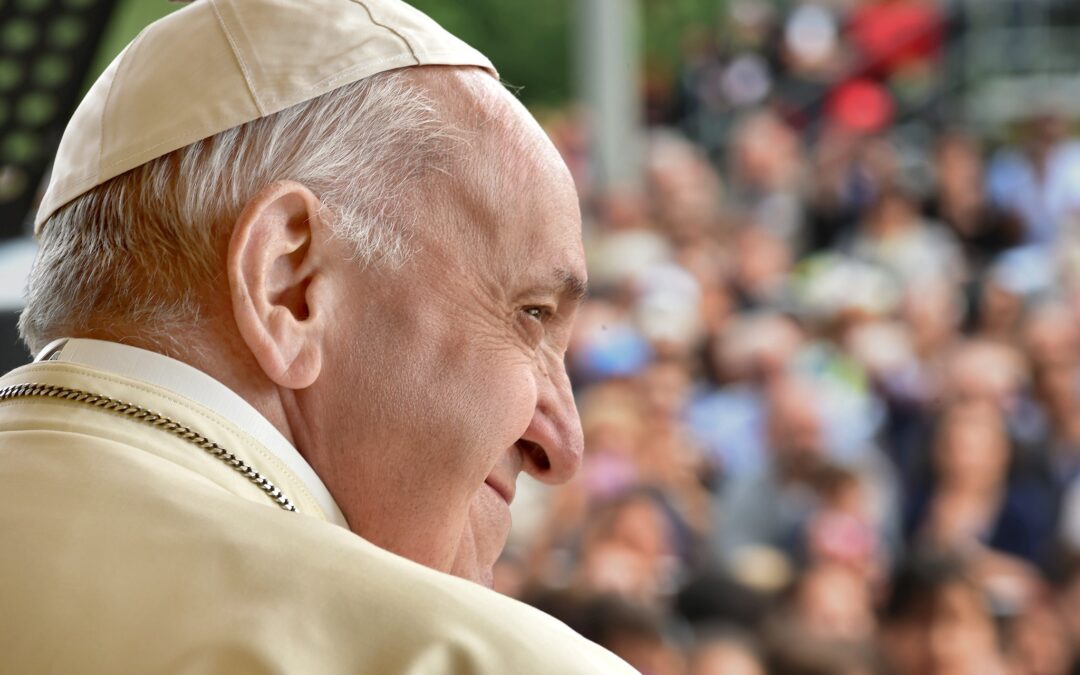
The President of the Focolare Movement, Margaret Karram, sent a message to Pope Francis assuring him of her affectionate closeness and fervent prayer.
She wrote, “May Mary envelop you with her maternal love and all the tenderness that you have always recommended that we should have for the good of every person next to us and every nation.”
She added, “I send you the embrace of everyone in the worldwide Focolare Movement who is praying and constantly offering up everything for you. We are infinitely grateful for your life completely given to God and given for the good of humanity.”
Photo: © Raffaelle Orefice–CSC Audiovisivi
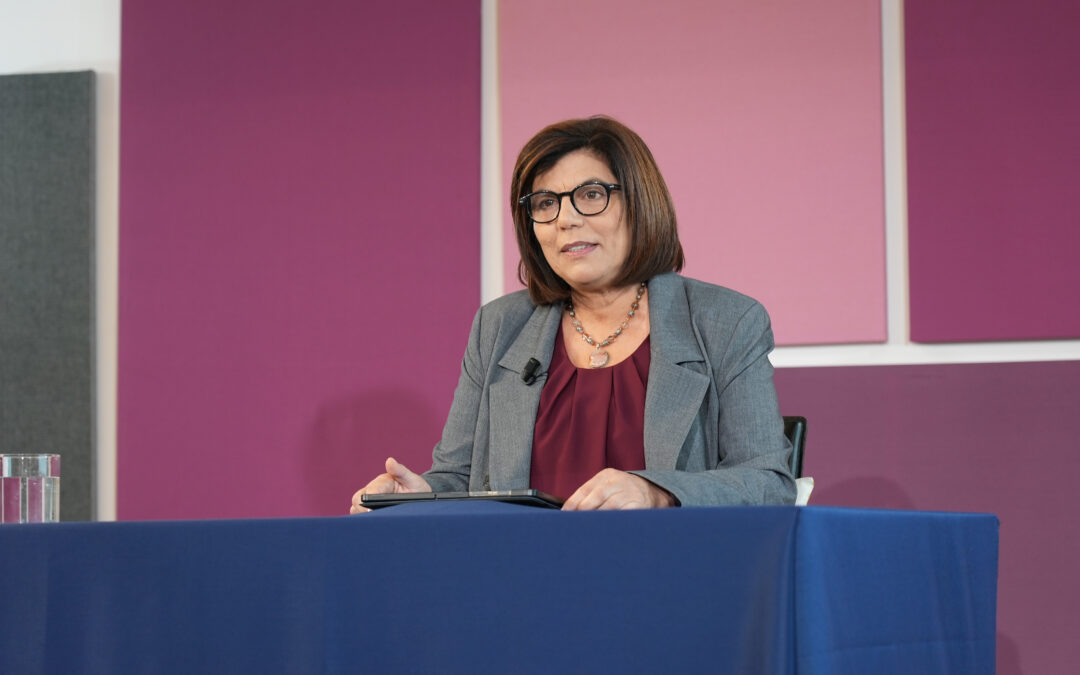
Margaret, why did you choose “closeness” as the theme of the year for the Focolare Movement in 2025?
I asked myself what kind of world are we living in? And it seems to me that at this moment in time there is so much loneliness and so much indifference. And there is an escalation of violence, of wars that bring so much pain all over the world. Also, I’ve been thinking about the technology that has connected us in ways we never knew before, but at the same time it makes us more and more individualistic. In a world like this, I think closeness can be an antidote; an aid to overcoming these obstacles and curing these “ills” that make us distant from one another.
Where can we start?
I have been asking myself this question for months. It seems to me that we need to re-learn how to approach people, re-learn how to look at and treat everyone as brothers and sisters. I felt that first of all, I had to examine my own attitude. Are the people I approach everyday brothers, are they sisters to me? Or am I indifferent towards them or even consider them enemies? I asked myself many questions. I have found that sometimes I want to avoid a person, because maybe they will bother me or annoy me or want to say difficult things to me. Because of all this, my reflection on closeness that I presented to those responsible for the Focolare Movement in mid-November was entitled, “Who are you for me?”
Could you tell us some of the main ideas you developed under this title?
Gladly. I’ll mention four thoughts. The first closeness that our soul experiences is its contact with God. He himself connects with our neighbours also through us. The desire to love the other person is like a movement from God in me directed to God in the other.
A second thought: Closeness is dynamic. It requires that we be completely open, that is, welcoming people without reservation, entering into their way of seeing things. We are not mass-produced! Each of us is unique, with a different character, mindset, culture, life and history. Recognizing and respecting this, calls for stepping outside of our mental and personal patterns.
You were talking about a third aspect …
Yes. The third aspect I want to emphasize is that closeness does not necessarily coincide with being near, with being similar, with belonging to the same culture. The parable of the Good Samaritan (Luke 10:25-37) expresses this very well. I was struck by the attitude of the Samaritan: The man who had fallen among the robbers was a person unknown to him, he was even from another people. He was a person who was distant both in culture and tradition. However, the Samaritan made himself a neighbour. This is the key point for me. Everyone has their own dignity, above and beyond the people and culture they come from, or their character. The Samaritan did not approach just to see if this person was hurt and then turn away or, at the most call for help. He made himself a neighbour and took care of the person. The fourth aspect …
… would be …
… is to let ourselves be wounded. If closeness is to bear fruit, each of us must not be afraid and must allow ourselves to be wounded by the other.
And that means, allowing ourselves to be challenged, being open to questions to which we have no answers; being willing to show that we are vulnerable; presenting ourselves as perhaps weak and incapable. The effect of an attitude like this can be surprising. Just think that a nine-year-old boy wrote to me that for him, closeness means “lifting up the other person’s heart.” Is this not a wonderful effect of closeness? Lifting up the heart of the other.
What would change within the Focolare Movement if we live closeness well?
If we really live it well so many things will change. I wish, hope, and pray that they will. But I also want to point out that many people in the Focolare Movement are already living closeness. There are so many initiatives, many projects for peace and for helping the poor. We have even opened focolares to give assistance and welcome to immigrants or to care for the environment.
And what should change?
The quality of relationships between people. Sometimes it is easier to treat people outside the Movement well and it is more difficult among us who are part of the same family. We are in danger of living relationships of “good manners” with each other: We do not hurt each other; however, I wonder, is this an authentic relationship?
So, I hope that, beyond the projects, closeness becomes a daily way of life; that we ask ourselves several times during the day: Am I living this closeness? How am I living it? An important expression of closeness is forgiveness. To be merciful to others—and to ourselves.
What message does it contain for society?
Closeness is not only a religious or spiritual attitude, but also a civil and social one. It is possible to live it in any environment. In education for example or medicine, even in politics, where it is perhaps more difficult. If we live it well, we can have a positive influence on relationships wherever we are.
What about the Church?
The church exists because, with the coming of Jesus, God became close. So, the Church, the Churches are called to witness a lived closeness. Recently we had the Synod in the Catholic Church. I was able to attend the two sessions at the Vatican. There we were more than 300 people, each from a different culture. What did we do? An exercise in synodality, an exercise in listening, in getting to know one another deeply, in welcoming the other’s thinking, their challenges and pains. These are all characteristics of closeness.
The title of the Synod was “Walking Together.” This walking involved so many people all over the world. The logo of the Synod expressed the desire to broaden the tent of the Church so that no one feels excluded. It seems to me that this is the true sense of closeness, that no one is excluded; that everyone feels welcomed, whether it is those who attend the church, those who do not feel that they belong to it or those who have even drifted away for various reasons.
I would like to mention for a moment the limits of closeness. How can we live it well?
This is an important question. Are there limits to closeness? As a first answer I would say there should be no limits.
However?
We cannot be sure that what is closeness and solidarity for us or for me, is necessarily closeness and solidarity for the other person. And in a relationship, we can never lack respect for each other’s freedom and conscience. These two things are essential in every relationship. That is why it is important that when we approach a person, we will always do it in a delicate way, and not as something imposed. It is the other person who decides how much and what kind of closeness he or she wants.
We have a lot to learn, don’t we?
Absolutely. We have made quite a few mistakes. In thinking we are loving the other person, instead we have hurt them. In the rush to communicate our spirituality, we have built relationships in which the other person has not always felt free. Sometimes it seems to me that with the good intention of loving a person, we crushed them. We did not have enough delicacy and respect for the other’s conscience, the other’s freedom, the other’s time. And this has led to certain forms of paternalism and even abuse.
Certainly, this is a very painful situation that we are facing, and where the people we have hurt have a unique, a really unique importance. Because on our own we cannot fully understand what has happened. It is the one who has been hurt who helps us understand the mistakes we have made and to take the necessary steps so that these things don’t happen again.
A final wish?
I hope that this theme can bring us back to the essence of what Jesus himself gave us in the Gospel. He gave us so many examples of what it means to live closeness.
There is a thought of Chiara Lubich that resonated very strongly with me in thinking about this theme. She says, “There are those who do things ‘out of love,’ there are those who do things trying to ‘be Love.’ Love places us in God, and God is Love. But the Love that is God, is light, and with light we can see whether our way of approaching and serving our neighbour is in line with the Heart of God, as our neighbour would desire it, as they would dream it to be, if it wasn’t us next to them, but Jesus.”
Thank you, Margaret, from the bottom of my heart, for your passion for a closeness that is lived with decision and respect.
Peter Forst
(Published in the magazine Neu Stadt)
Photo: © Austin Im-CSC Audiovisivi
Transmit hope!
Value relationships
Don’t be afraid of difference!
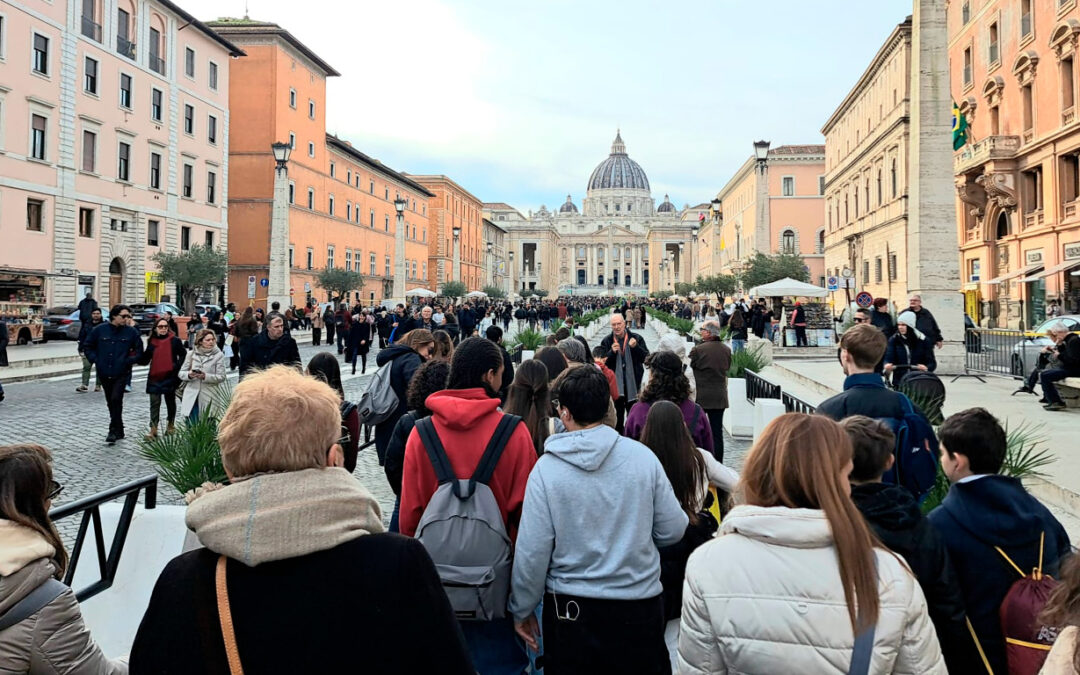
The Holy Year has its spiritual roots in the Jewish tradition, where every 50 years a “jubilee” was celebrated, bringing freedom to slaves and prisoners. In the Catholic Church Pope Boniface VIII proclaimed the first Holy Year in 1300. Since then, an “indulgence” has accompanied the Holy Year, which the faithful can obtain, under certain conditions, by passing through a “Holy Door”.
However, Lutherans like me generally don’t feel comfortable with the word “indulgence,” as it brings us back to the Reformation period and the scandal of the sale of indulgences in the Catholic Church. This practice was banned by the Council of Trent and therefore no longer exists. However, I have noticed that the term “indulgence” is still loaded with misunderstandings among believers of all denominations. One of the most widespread misconceptions is that indulgences can forgive someone’s sins but according to the teaching of the Catholic Church, this is not the case. The forgiveness of sins takes place, as it does in the Lutheran Church, through confession, penance and absolution by a pastor who acts in the name of Jesus.
From my point of view, indulgences instead touch a psychological dimension of sin, the part that often remains in our memory (even after absolution), perhaps a wound or a feeling of fear or sadness… In any case, there is still psychological work to be done. That is why, in the passage through the “Holy Door”, I see an invitation to open a door in my heart to compassion and reconciliation, to let go of whatever blocks me on the path to true freedom and authentic peace. It is a conscious decision, a process that is set in motion. The fundamental thing, from the Christian point of view, is that the success of this process does not depend on me, but on the hands of the One who holds the world in His hands. Only His grace can finally heal the wounds in my life or reconcile humanity.
“In the passage through the ‘Holy Door’,
I see an invitation to open a door
in my heart to compassion
and reconciliation,
to let go of whatever blocks me
on the path to true freedom
and authentic peace”.
Corinna Mühlstedt
recently published, together with Abbot Notkar Wolff,
a spiritual ecumenical guide to Rome for the Holy Year.
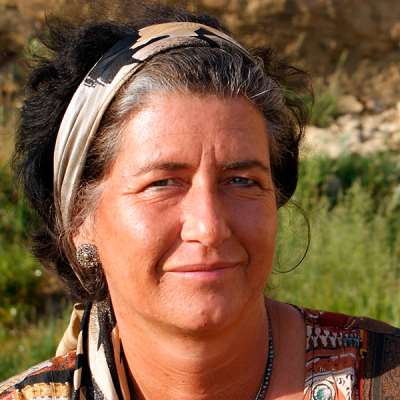
For me, therefore, passing though through this door symbolizes the decision to follow Jesus (once again) and choose the path of true life. As He says in the Gospel of John (Jn. 10: 9): “I am the gate. Whoever enters through me will be saved”! To my great joy, the Bull of Indiction “Hope does not disappoint”, in which Pope Francis announces the 2025 Holy Year, has a clear ecumenical dimension. It starts from God’s grace, in which all human beings partake and defines the Holy Year as “an invitation to all Churches and Ecclesial Communities to persevere on the path to visible unity and in the quest of finding ways to respond fully to the prayer of Jesus: ‘that they may all be one`” (Jn 17:21).[1]
Therefore the theme of “hope” for the Holy Year 2025 has a positive resonance for all Christians. The Lutheran World Federation has chosen “Sharing Hope” as its motto for the year 2025. And the World Council of Churches, which represents the majority of Protestant and Orthodox Churches, anticipates an “Ecumenical Year” along the “path of justice, reconciliation and unity”. If goodwill leads to concrete actions, then the 2025 Holy Year could open doors for ecumenism, which could bring separated Christians closer. As Pope Francis wrote, ” Let us even now be drawn to this hope! Through our witness, may hope spread to all those who anxiously seek it.” [2]
Corinna Mühlstedt
[1] Pope Francis, Spes non confundit, Bull of Indiction of the Ordinary Jubilee of the Year 2025, 9 May 2024, 17.
[2] Papa Francesco, ibidem, 25.
The Focolare Movement is organizing an international ecumenical conference entitled:
“Called to hope – key players of dialogue” to which all are invited.
It will take place from 26th-29th March 2025.
As Christians, in a time of divisions and great challenges, we are called together to witness the hope of the Gospel
and to be protagonists of dialogue and unity, committing ourselves to live for peace, to build fraternity, to spread hope.
Through round tables, interviews and testimonies we aim to offer method and spirituality to dialogue
together with good practices and ecumenical initiatives already underway
Link to the invitation
Revive love!
Discover the true being of others
To love is to give

A simple bar of nougat
I meet regularly with the synod team in my Parish. At a local assembly, seven people are elected for one year to work on the implementation of the synodal process. We meet in the evenings, sometimes carrying with us the weight of our fatigue and personal worries, even if we try to set them aside in order to put ourselves at the service of the community.
At one meeting, using the excuse that it was the “Week of Sweetness”, I brought a bar of nougat for each one. We were all happy as children, we relaxed and the atmosphere changed. I realized that communion is built with small gestures.
(C.P. – Argentina)
They chose peace
Marc and Maria Antonia, both in their fifties, were surprised to inherit a small industrial machinery company from Marc’s godfather—an uncle who had loved him dearly. They thought long and hard about what to do but eventually decided to keep the company rather than sell it, partly to preserve the jobs of the six employees and partly with the hope of running their own business, involving their son, who had studied materials engineering.
Despite their enthusiasm, dedication, and effort, they faced tough times. The business was struggling. A year after taking over, they had to lay off two workers and return machinery they couldn’t fully pay for. They also had debts with banks and family members.
In the evenings, exhausted, they started wondering if they had made the wrong decision. But they didn’t give up; they pushed forward, looking for new clients. Slowly, the company stabilized, stopped losing money, and they began repaying their debts. However, they were left with very little to live on.
They endured another difficult period until a new client approached them with a large, ongoing order that could finally give them financial stability. They were thrilled—until they realized that their production would be for the arms industry, specifically cannon parts. They were shaken. Could they just turn a blind eye? After all, if they didn’t take the job, someone else would.
They had many conversations, including one with Pedro, and spent several sleepless nights. But they knew they did not want to contribute, even indirectly, to violent death. They refused the order.
After this difficult decision, incredibly the company got other jobs and managed to keep going, despite the difficulties.
(A.M. Spain – from LAR magazine)
Believing
We are raising funds to travel from our country, the Philippines, to Rome to participate in the Youth Jubilee. Recently two elderly ladies came to us bringing us some coins from their piggy bank. One of them handed us the coins and said, “These were collected over the course of a year on the small altar I have in my house.” this humble but profound gift, a result of faith and sacrifice, left us stunned.
(some young people from the Philippines)
Edited by Carlos Mana
Photo: © Jonathan en Pixabay
Be close to those who pass by
Embrace each person with love
Create spaces free of judgement
Be compassionate
Share your weaknesses
Respect the planet
Live in God’s presence
Heal wounds
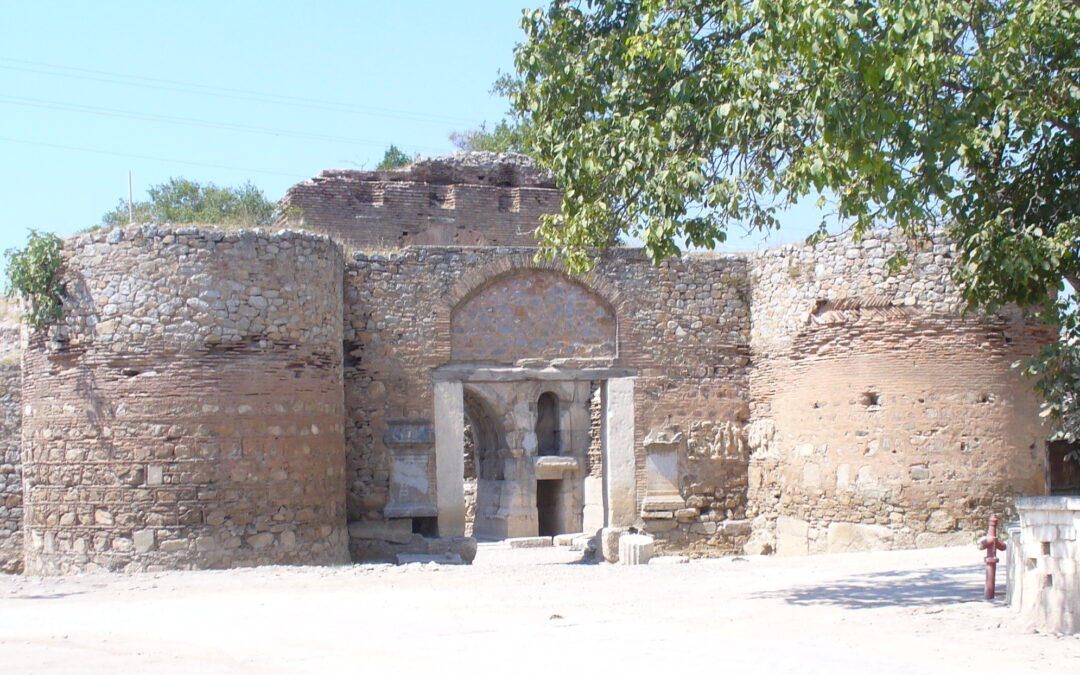
Already well-publicised and being experienced around the world by many Catholics is the Jubilee Year which this 2025 has ‘Pilgrims of Hope’ as its theme. Millions of people will visit Rome or the various jubilee churches in dioceses around the world, and experience the grace of God’s mercy by praying for forgiveness, resolving to convert one’s life and passing through the holy door, which symbolically reminds us that Christ is “the door”. Why “Pilgrims of hope”? Because we are called to hope.
Less well-known is the fact that 2025 marks two other important anniversaries of great ecumenical significance – the 1700th anniversary of the Council of Nicaea and the 60th anniversary of the abolition of the mutual excommunications between the Church of Rome and the Church of Constantinople.
Why is it so important to celebrate an ecclesial meeting that took place 1700 years ago? And why have Pope Francis, Ecumenical Patriarch of Constantinople Bartholomew I and other leaders of various Churches chosen to travel to Nicaea in Turkey on 24 May 2025 for a joint commemoration?
Every Sunday, Christians from all the different Churches profess the same faith affirmed at that Council. It was precisely at Nicaea, therefore, that the basis of our faith was sealed, God – One and Triune, Jesus Christ – true Man and true God. Knowing that the churches have this basis in common means that praying for unity is both a prayer to achieve it and a celebration of thanksgiving for the unity already exists.
The Council of Nicaea had also set a date for celebrating Easter but, because of the change of calendar in the West that Pope Gregory XIII introduced, the date of this feast often did not coincide for the Eastern and Western Churches. This year, by a lucky coincidence, the dates do coincide. Easter will fall on 20 April 2025 for everyone. Many Christians around the world, including Pope Francis and Patriarch Bartholomew, are promoting the creation of a common calendar that will allow this feast to always coincide with the centre of the Christian faith.
The Focolare Movement is taking the opportunity to celebrate these anniversaries with an international ecumenical conference entitled “Called to hope – key players of dialogue”. In these times of division and great challenges, we are called as Christians to give witness together to the hope that the Gospel brings and to be key players of dialogue and unity, committed to living for peace, building fraternity and spreading hope. Round tables, interviews and testimonies are intended to offer method and spirituality to the dialogue together with examples of good practice and ecumenical pathways that already exist.
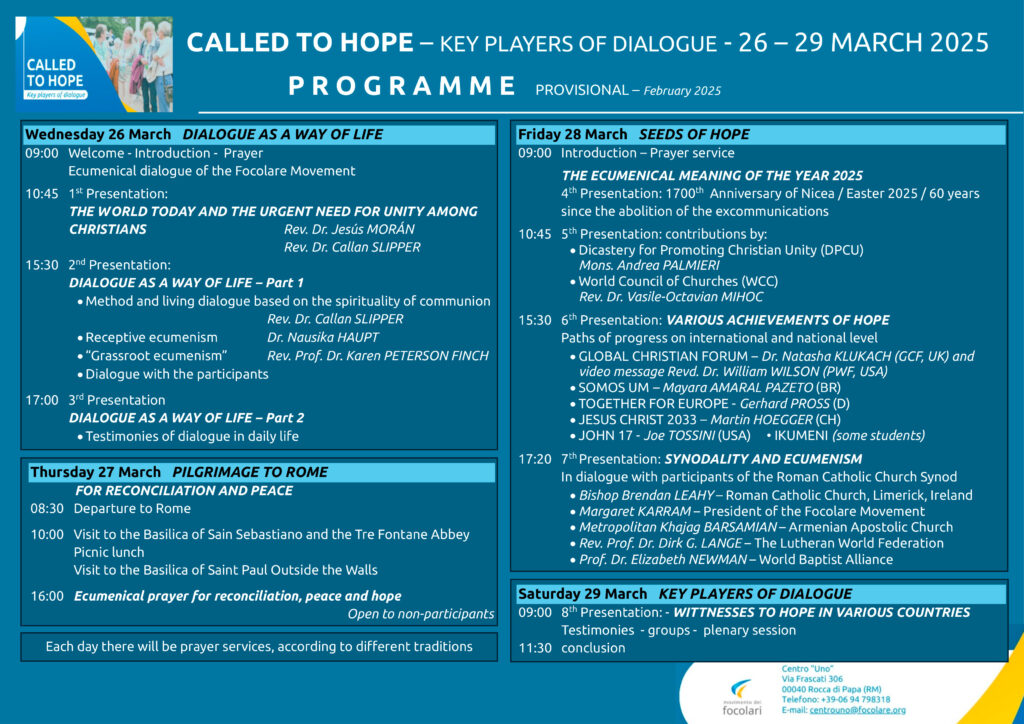
Photo Nicea: © Di QuartierLatin1968 – Opera propria, CC BY-SA 3.0, https://commons.wikimedia.org/w/index.php?curid=4675764
Be creative in bringing about a new culture
Support those who suffer
Share
Share the sufferings of others
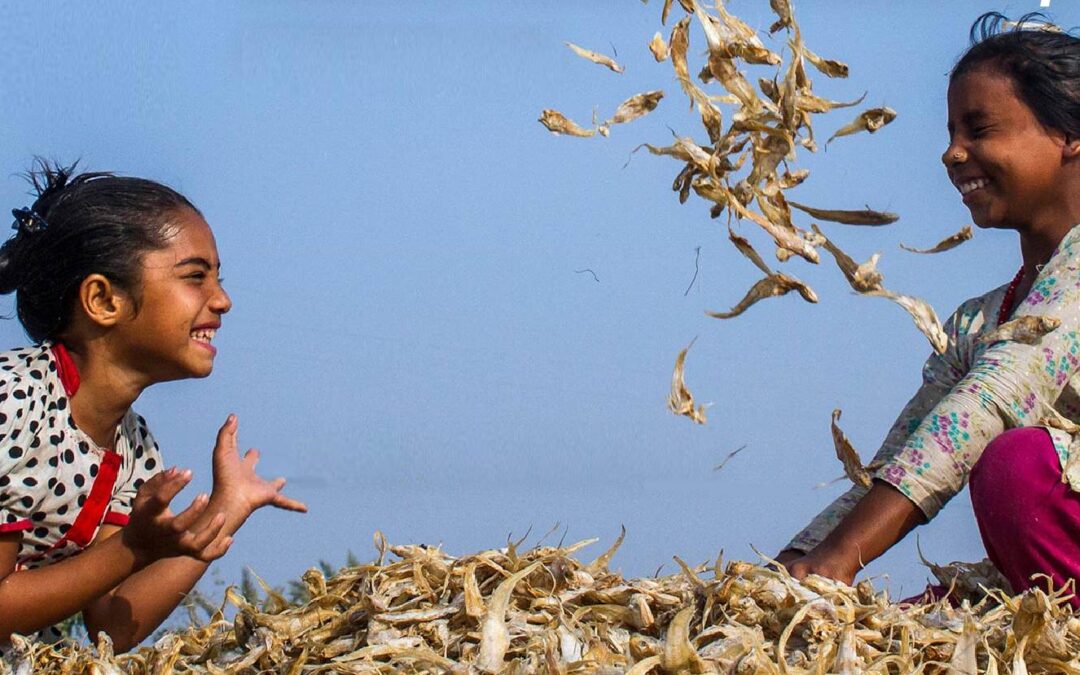
This February we celebrate the XI International Day of Prayer and Awareness against Human Trafficking which falls annually on 8 February – the feast of St Josephine Bakhita, the Sudanese nun who had the dramatic experience of being trafficked as a child.
This year the event is inspired by Pope Francis‘ invitation to be pilgrims of peace and apostles of hope and is part of the events linked to the Jubilee 2025. The theme is: Ambassadors of Hope: Together against Human Trafficking.
Celebrated all over the world, the World Day of Prayer and Awareness against Human Trafficking was introduced by Pope Francis in 2015. Coordinated by Talitha Kum, it draws on a network of organisations – including the Focolare Movement – with the aim of praying together, reflecting collectively on the realities of human trafficking and supporting victims, survivors and vulnerable populations. In a particular way, this initiative aims to promote and help women, children, migrants, refugees and young people.
This year, during the week of 4 to 10 February, various events will take place to raise awareness of the issue. More than 100 representatives of the various partner organisations – young people from all over the world, supporters and activists, survivors, refugees, migrants and public figures from the world of art and cinema – will gather in Rome to promote an appeal for hope, peace, love and unity of the Catholic Church with the aim of healing the wounds of the world. Among other events, Gen Verde will participate in the event ‘Invoking Hope and Promoting Healing Events’ on 6 February at 4-7pm (Italian time) at the Pontifical University of the Holy Cross.
But the central event will be the online pilgrimage scheduled for 7 February from 11.30 a.m. to 4.30 p.m. (Italian time): a marathon of prayer and reflection across all continents and available in five languages.
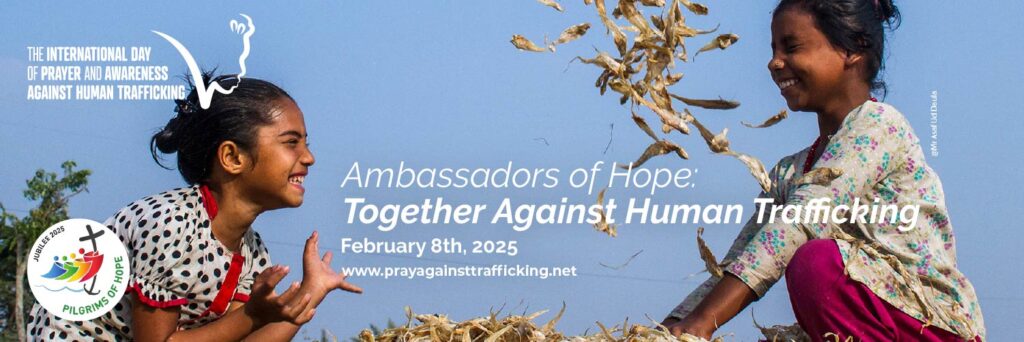
Recently, the Dicastery for the Doctrine of the Faith published the Declaration ‘Dignitas Infinita’ referring to serious violations of human dignity, such as human trafficking described as ‘an ignoble activity, a disgrace for our societies that call themselves civilised’. Likewise, it stresses the importance of combating phenomena such as the ‘trade in human organs and tissues, sexual exploitation of children and young girls, slave labour, including prostitution, drug and arms trafficking, terrorism and organised international crime’. It also mentions the repercussions of this crime against humanity. “Trafficking defaces the victim’s humanity, offending their freedom and dignity”.
It is currently estimated that 50 million people globally are affected by modern day slavery. Those who suffer the consequences most are women and children. The Jubilee year and the theme of hope highlight the importance of promoting this value through concrete actions such as the global fight against the despicable reality of human trafficking. We are therefore called to action, to be ambassadors of hope, because the human dignity and fraternity that we all uphold are in grave danger.
For more info info: www.preghieracontrotratta.org
Lorenzo Russo
Do everything with commitment
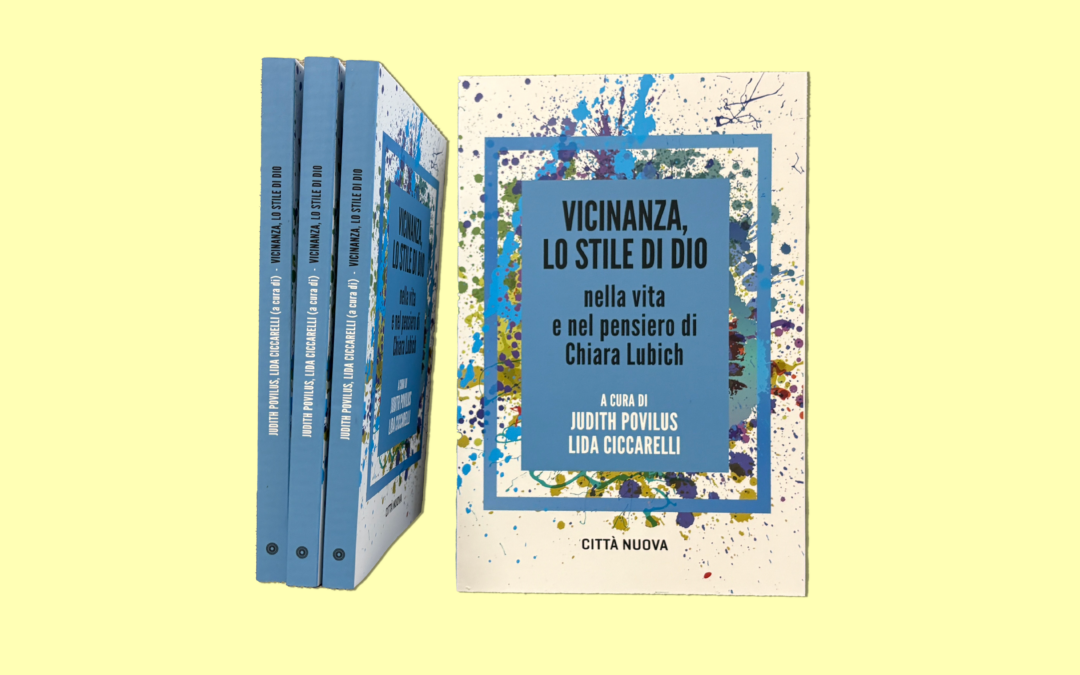
Chiara Lubich, founder of the Focolare Movement, repeatedly spoke in her speeches about closeness as God’s way of being near to humanity. As reflected in the title of this book, Closeness is the style of God which, through His life, Jesus revealed to us. It is also the main way to bring God to men and women today. To gain a deeper understanding of the book’s content, we interviewed the authors: Judith Povilus and Lida Ciccarelli.
Lida, Judith, what is the book about?
Lida: “It is a collection of Chiara Lubich’s ideas on the theme of love for others from the perspective of proximity. This is a topic dear to Pope Francis, who has often urged people to take care of the world around them and to be close to our brothers and sisters in the style of God: closeness.”
Judith: “For the English edition, we wondered how to translate the title. The solution could be the answer to your question: Learning Closeness from God—learning from God how to be close, recognizing how He has drawn near to us, so that we, in turn, may be close to those around us.”
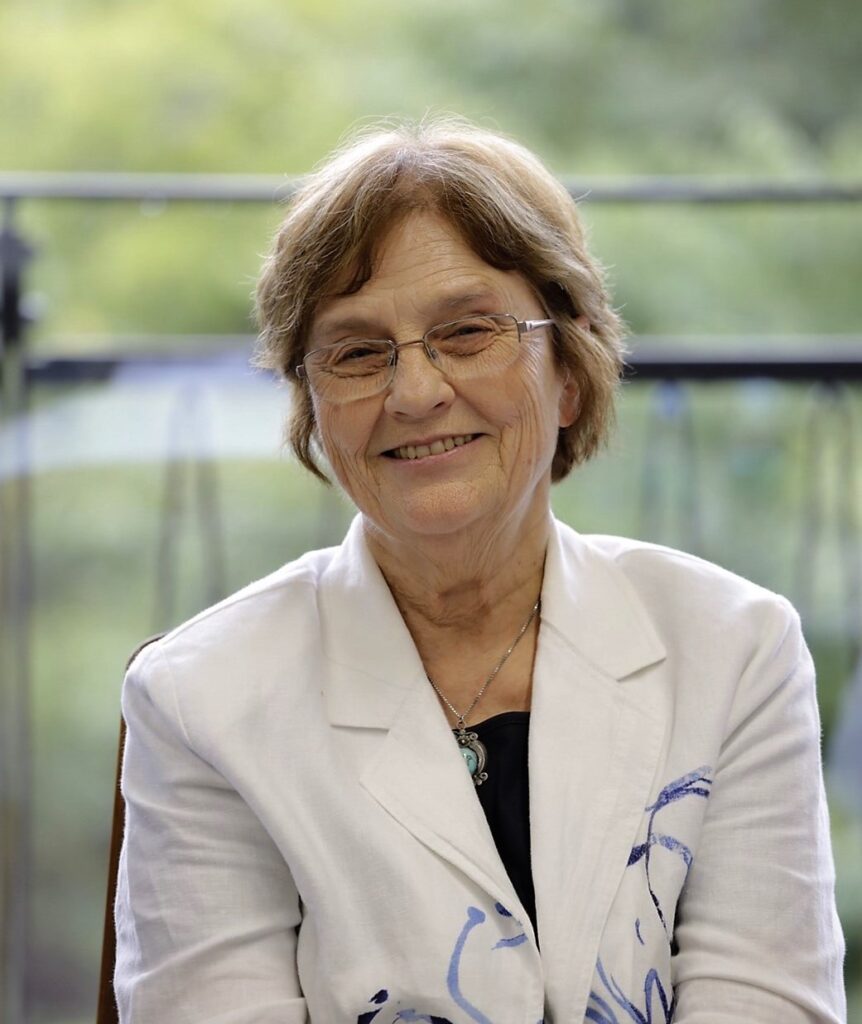
Judith Povilus, PhD in Fundamental Theology, is Emeritus Professor of Logic and Foundations of Mathematics at Sophia University Institute (Loppiano, Florence). She is the author of: The Presence of Jesus Among His Own in Today’s Theology (1977); Jesus in Our Midst in the Writings of Chiara Lubich (1981); Numbers and Light: On the Sapiential Meaning of Mathematics (2013); and co-editor of Unity: A Glimpse from Chiara Lubich’s ‘Paradise ’49’ (2021). (2021).
How can we bring God into today’s world, where there is so much loneliness, indifference, war, and division?
Lida: “If we look around us, there are reasons to be pessimistic. Yet, as Christians, we are always called to witness God’s love. For me, the way forward is the path of Jesus: society back then was no better than today’s, yet Jesus always brought the life of heaven. We must do the same, where there is no love, let us bring love; where there is loneliness, let us become companions in life; where there is division, let us be instruments of reconciliation and unity.”
Who is the ‘neighbour’ to whom we bring God?
Judith: “The encyclical Fratelli tutti recalls the Parable of the Good Samaritan, where the Scribe asks Jesus, ‘Who is my neighbour?’ Jesus turns the question around, showing that everyone is a candidate to be my neighbour. There are no limits—it is up to me to draw near to others. Being a neighbour is a transformative act. Your question is beautiful: finding God is what every human being most deeply longs for, even if they are unaware of it. Let us allow God to live in us, so that through our love, He may touch hearts.”
Cultural, social, and political differences often lead to fragmentation and polarization, increasing fear of others. Chiara Lubich’s ideal of unity challenges this trend.
Lida: “That’s absolutely true. Chiara was countercultural. She embedded in us a simple yet revolutionary idea: we are all brothers and sisters because we are all children of the Father in heaven. It is a simple idea, yet it makes us free and breaks down walls of division. If we put it into practice, it changes our lives. The other person, whether young or old, whether they share my views or not, whether rich or poor, a foreigner or someone from my own country, should be seen with new eyes. Everyone is a child of the Father and everyone, absolutely everyone, is loved by the Father just as I am.”
Lida Ciccarelli, with degrees in Philosophy and Moral Theology, is a professor of Church History and Spiritual Theology at the Mystici Corporis International Institute (Loppiano, Italy). A former member of the Spirituality Commission at the General Secretariat of the Synod, she is currently a Postulator at the Dicastery for the Causes of Saints.
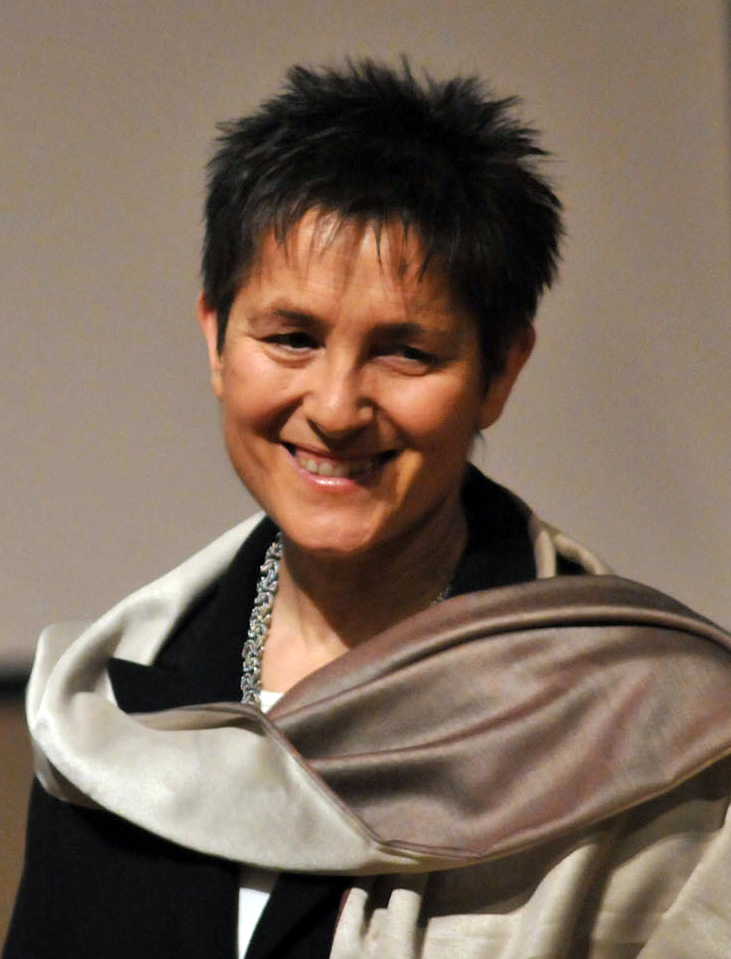
Proximity is a key concept both in Christian Churches and in other religious traditions. Is it the path to universal fraternity?
Lida: “That’s exactly what we experienced recently with a group of young Shiite Muslims, students of Dr. Mohammad Ali Shomali, Director of the International Institute for Islamic Studies in Qum, Iran. They came to Sophia University, in the little town of Loppiano, for a short course on Christianity. We did not so much speak about fraternity—we lived it.”
Judith “I was responsible for several lessons on the spirituality of unity. While speaking about God as Love, I told them the Parable of the Prodigal Son. I asked: ‘Is anyone here a father? Can you understand the depth of this mercy-filled love?’ Seven of them were young fathers. During a break, they joyfully and emotionally showed me photos of their children. In this atmosphere, their spontaneous questions about spirituality allowed them to understand the charism of unity more deeply. With joy, we discovered common ground or clarified aspects of Christianity that had previously been unclear. I realized that closeness, with all its human nuances and the willingness to share in the life of others, is truly the path to sharing the gift of the charism, which is for everyone, non-Christians too. Together, we can be builders of a more fraternal world.”
What advice would you give to readers? How should they view others?
Lida: “If the reader is already familiar with Chiara’s writings, I would suggest approaching them as if for the first time. Then, pause whenever something strikes you and listen to Wisdom knocking at the door of your heart.”
Judith: “Yes, indeed, Chiara’s writings in the anthology section are profound, diverse in genre and content. They cannot be read all at once. Personally, every time I meditate on one writing or another, I discover new insights or new steps to take.”
Lida: “So, in conclusion, how should we view other people? As Jesus looked at the rich young man: ‘He looked at him and loved him.’ What must that gaze have been like? A gaze of love, freely given, that reaches deep within and says: You are important to me, I love you just as you are.”
Lorenzo Russo